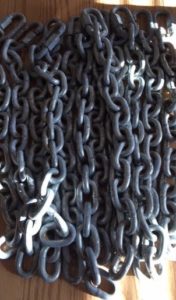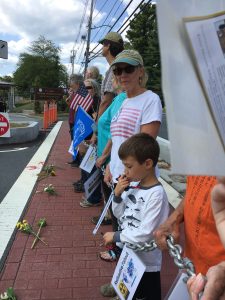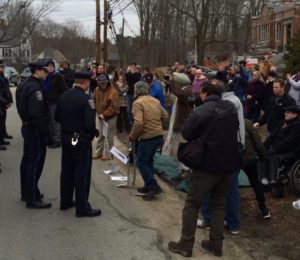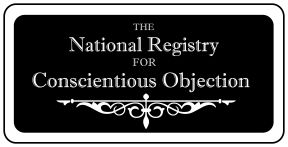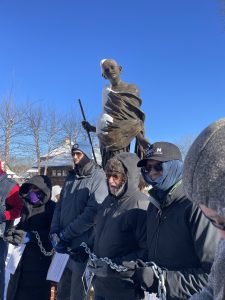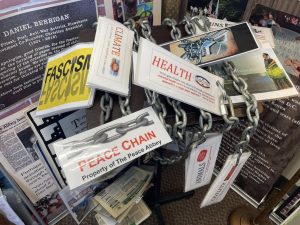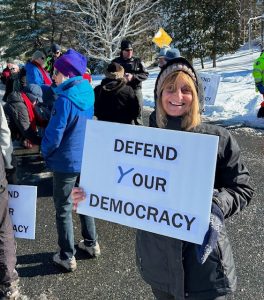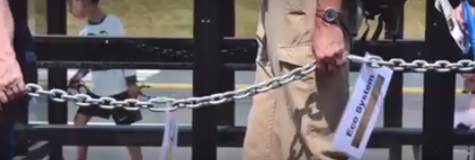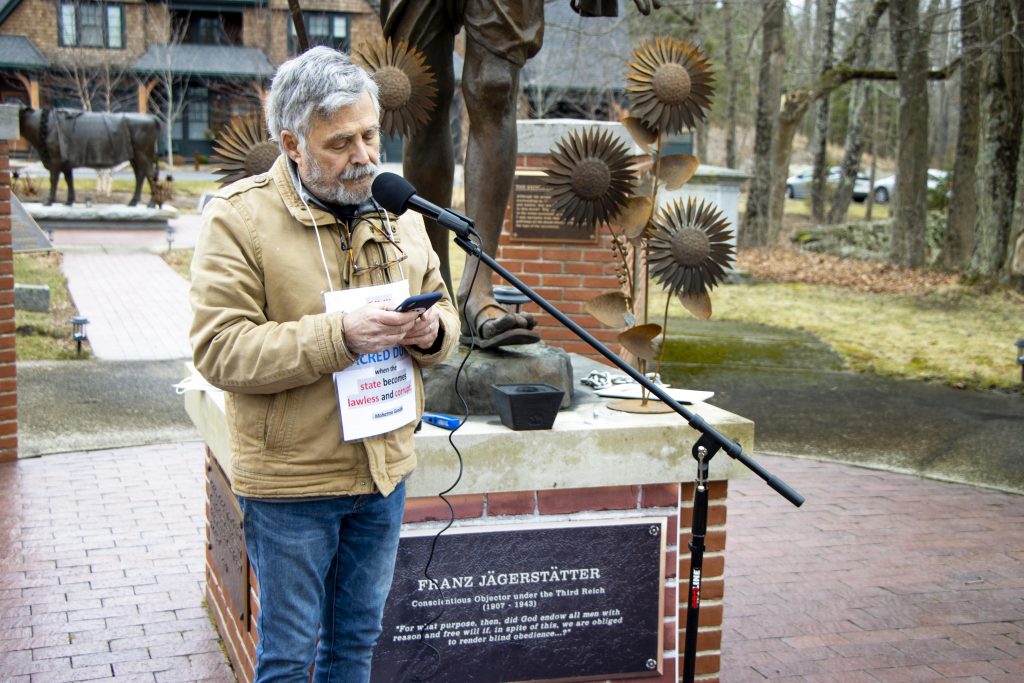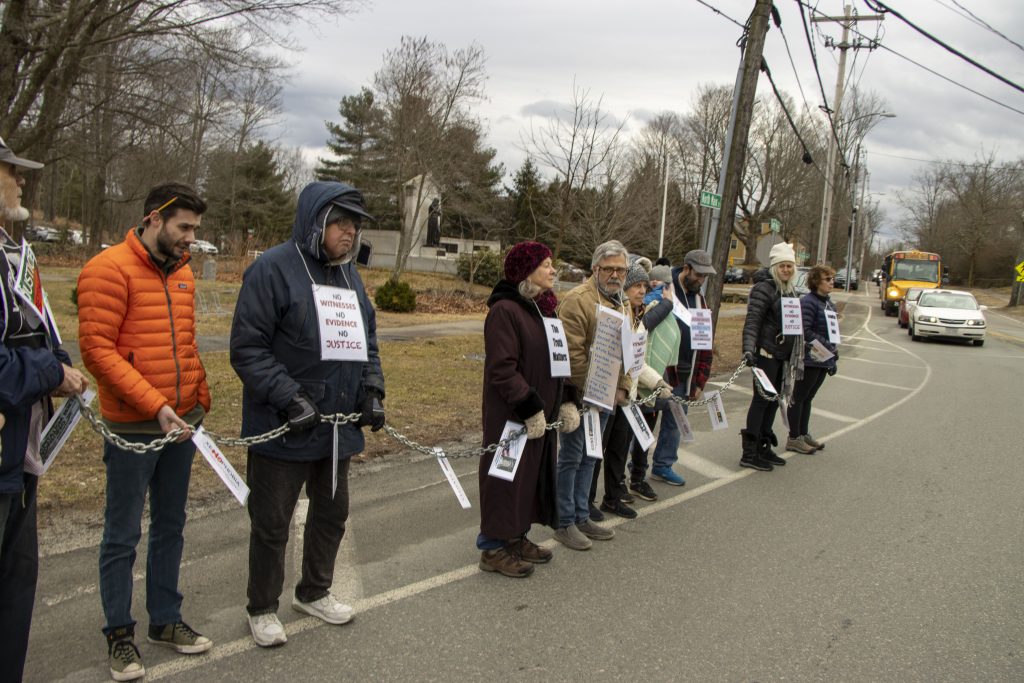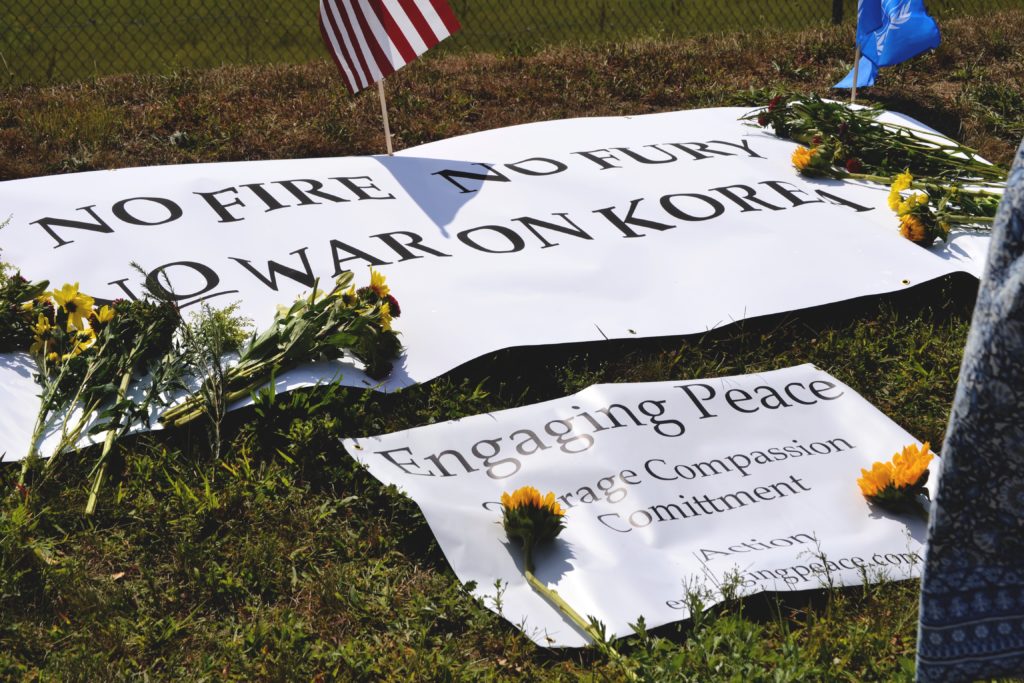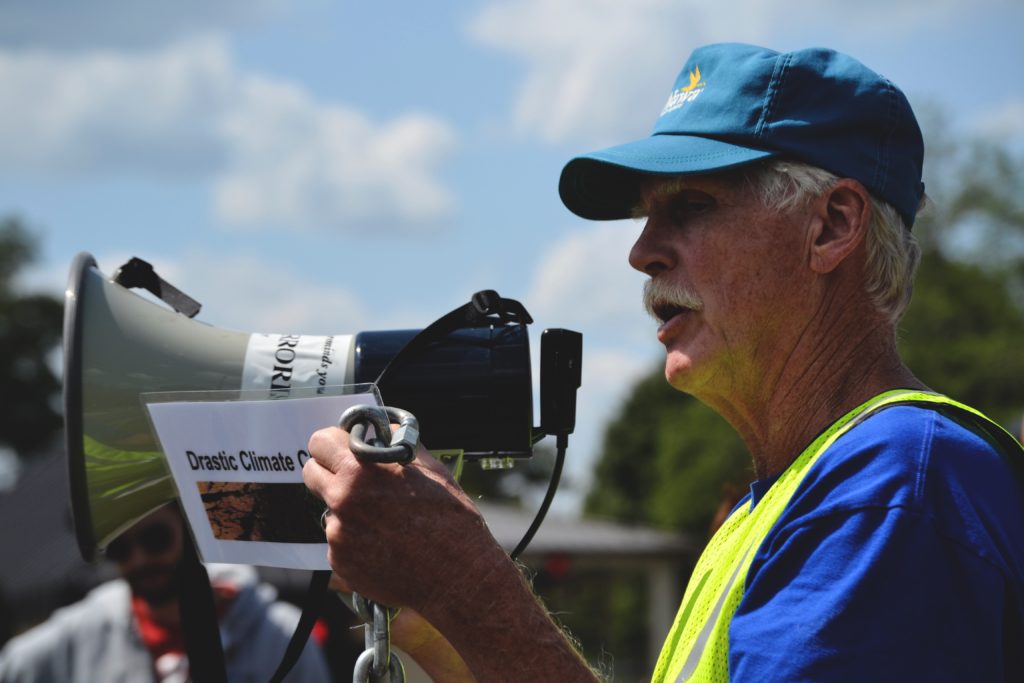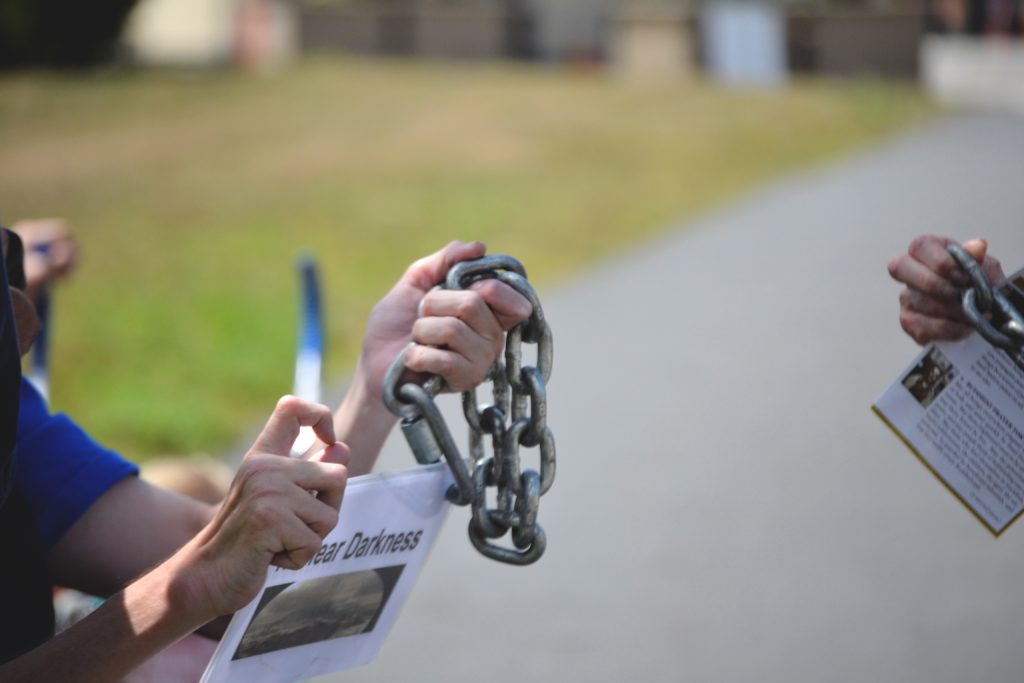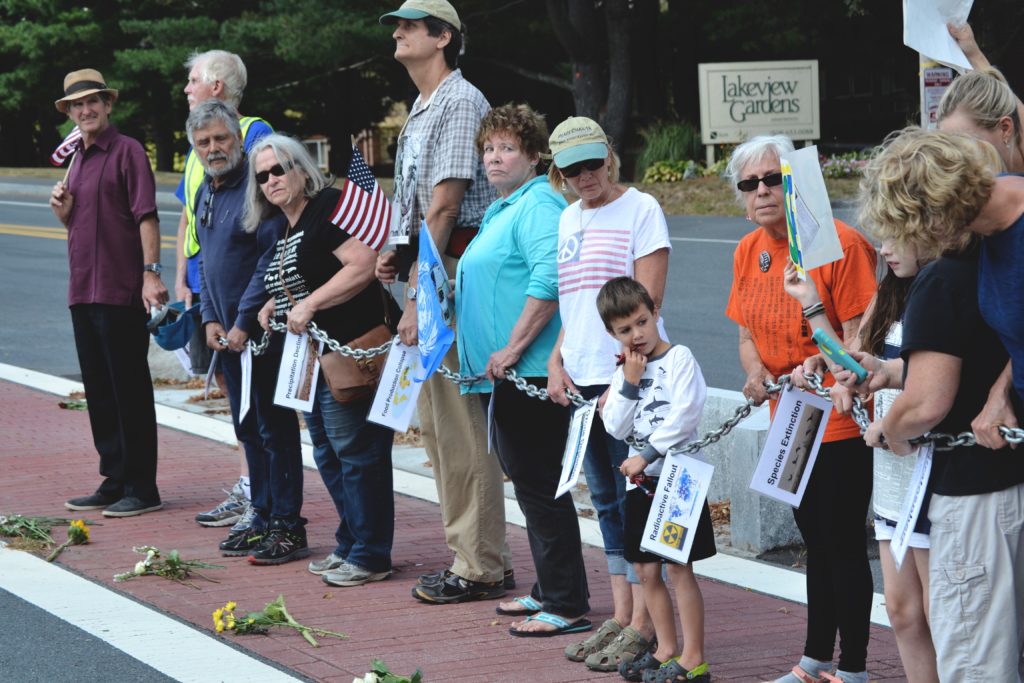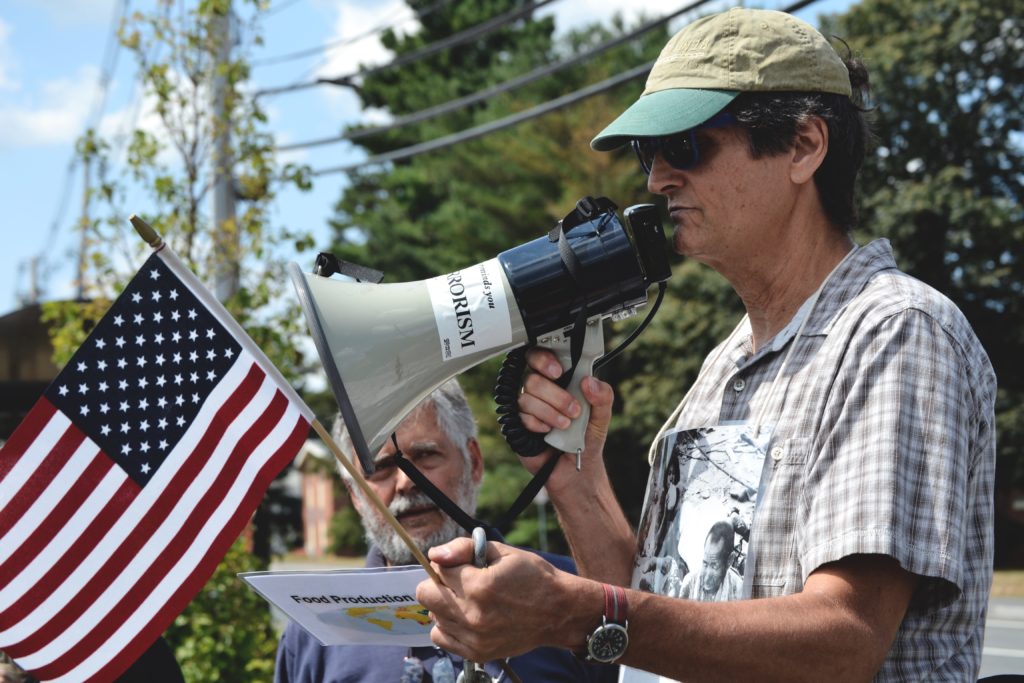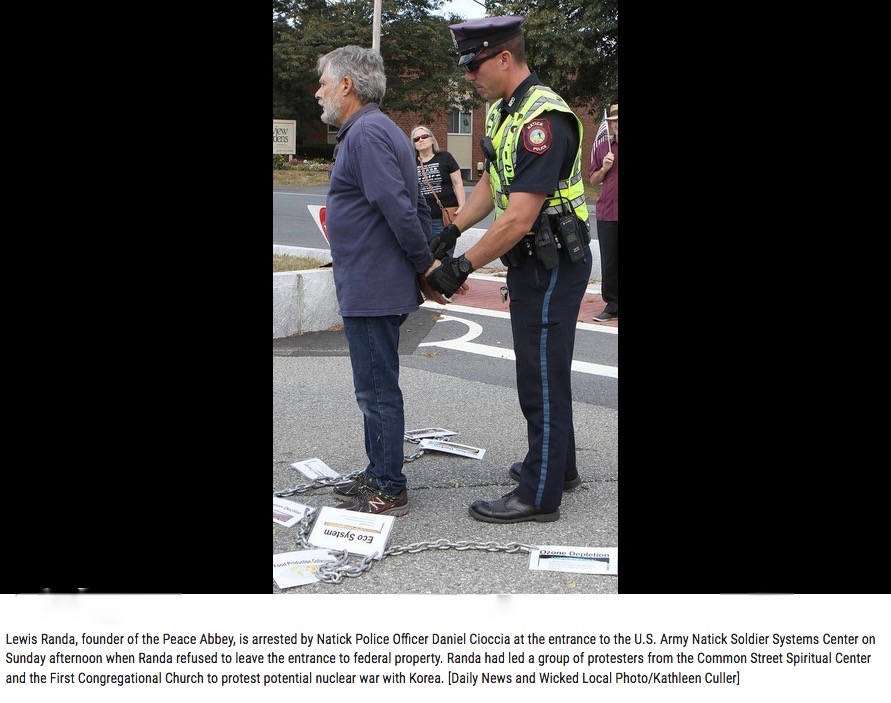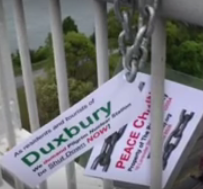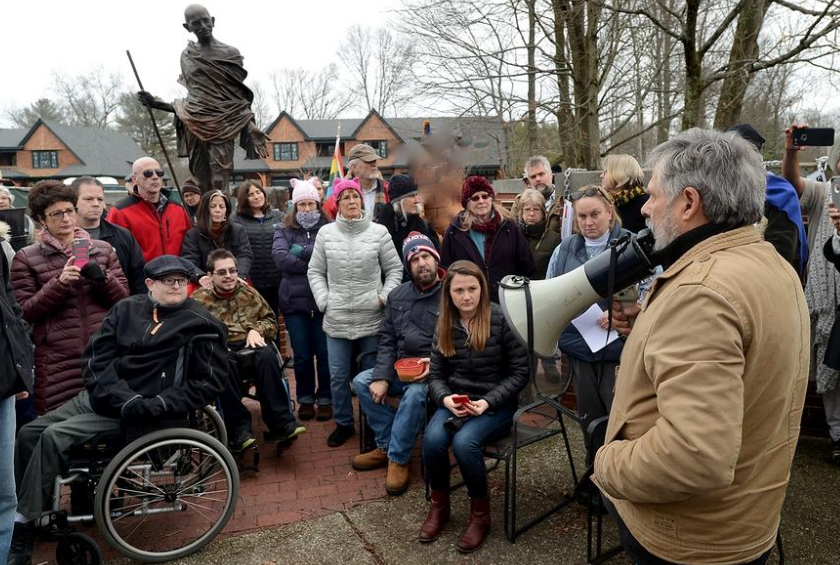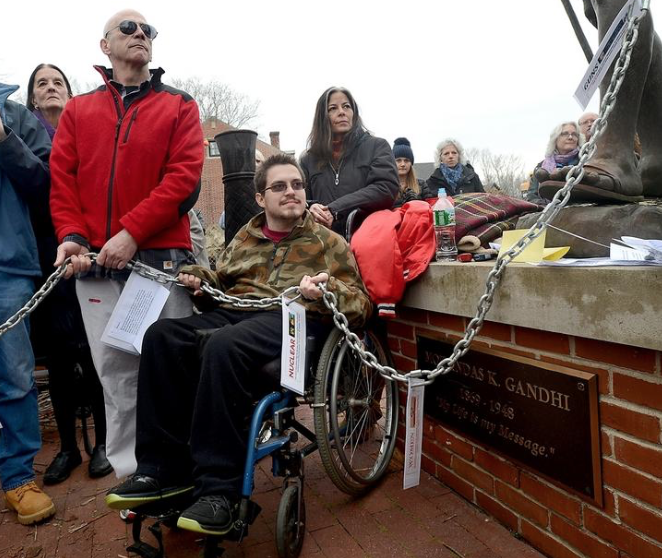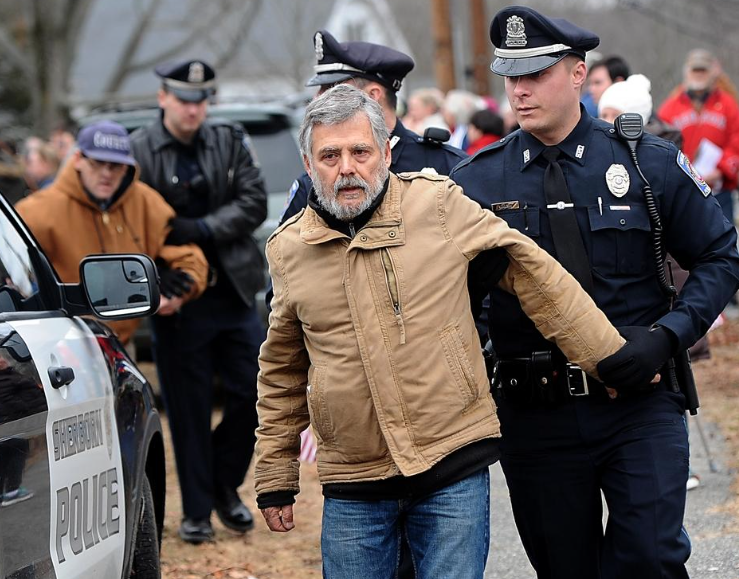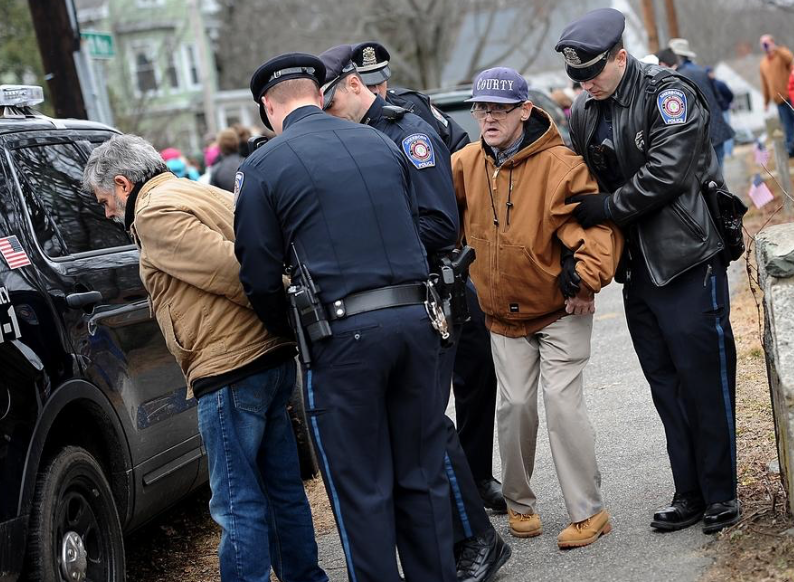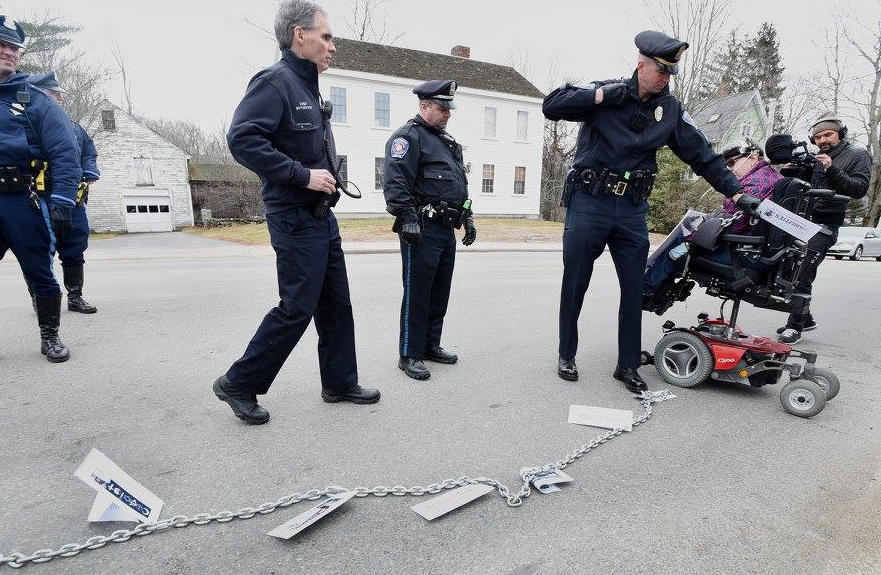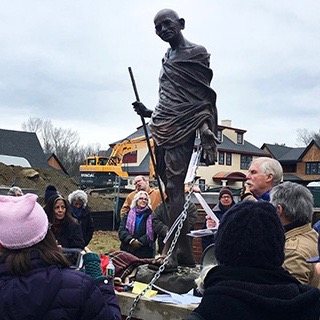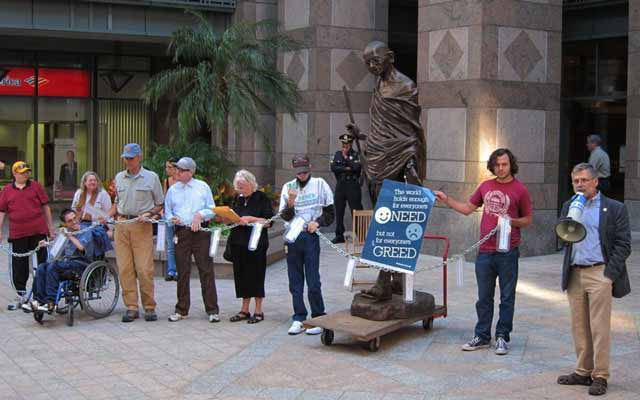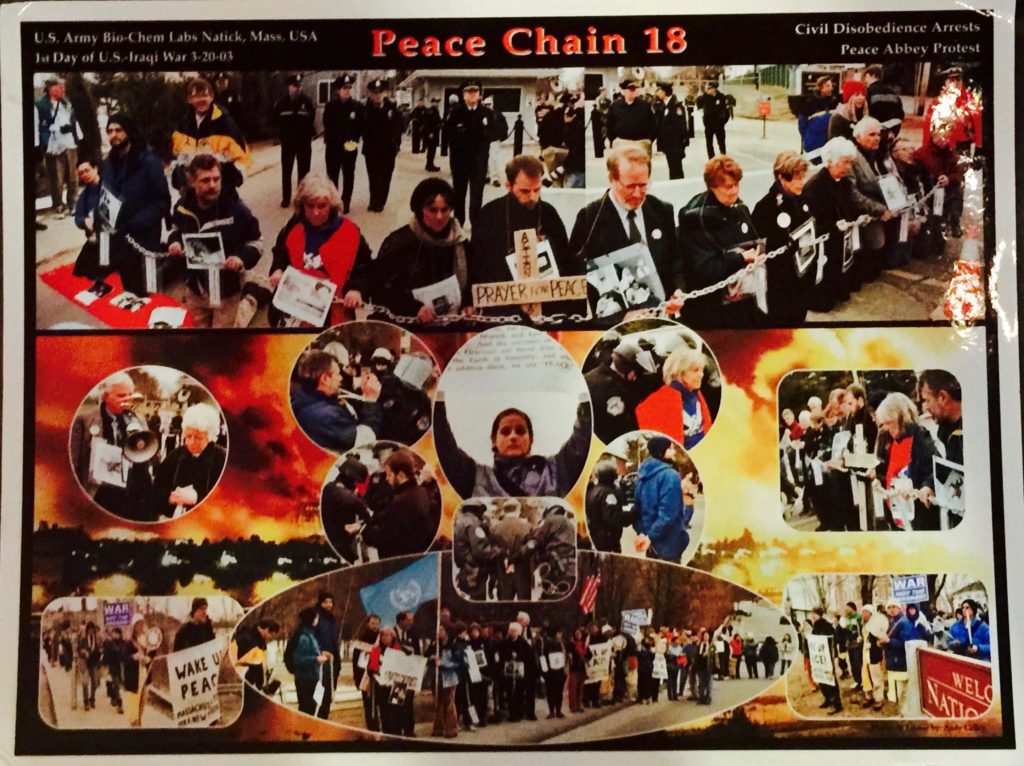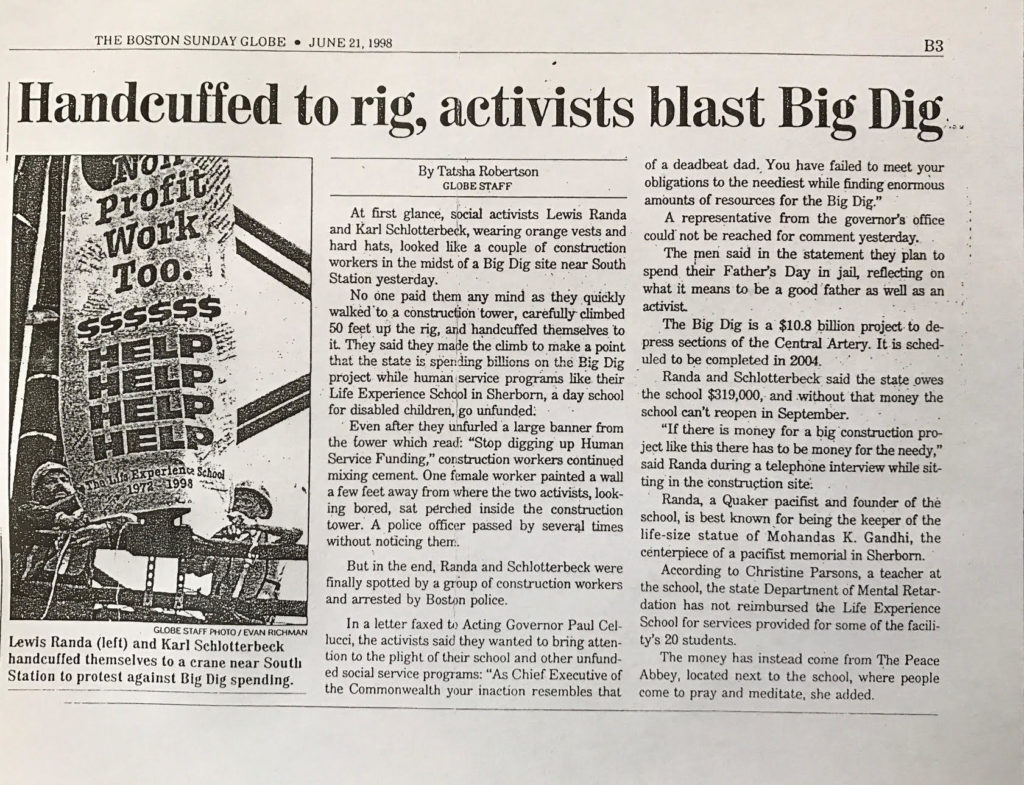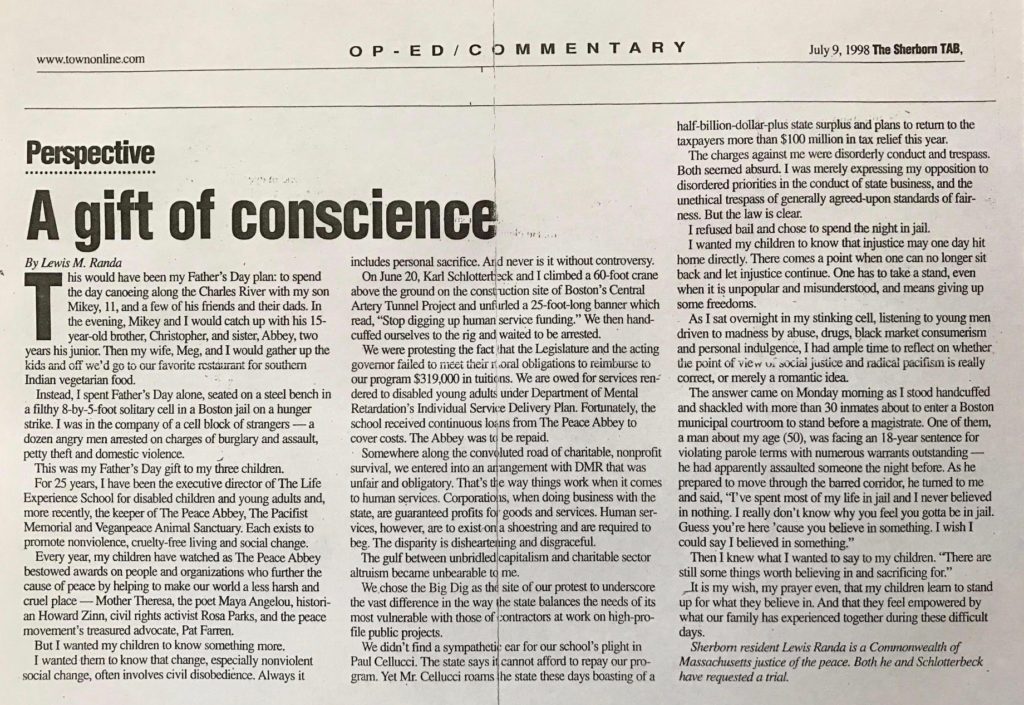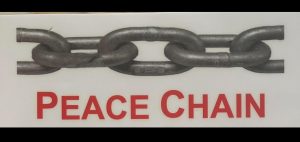
Engaging Communities in Peace Activism
INAUGURATION DAY
Martin Luther King Jr. Day of Service
Peace Chain Grievances
January 20, 2025
PEACE CHAIN LIST OF GRIEVANCES
Presenters:
Civility – John Higley
Gun Violence – Madeline Champagne
Health – Susan Higley
Homelessness – Alan Burt
Animals – Philip Murphy
Capitalism – Roger Gottlieb
Freedom of the Press – Dan Dick
Women – Meg Randa
Climate – Bill Holcombe
Religion – Trish Garland
Immigration – Lewis Randa
Fascism – Miriam Greenspan
The grievances listed below, though supported by nearly all Peace Chain participants and contested by a few, are recognized as the genuine sentiments of those who wrote and presented these accounts.
1. CIVILITY
Written and Delivered by John Higley
The 2017 Peace Chain Grievances began asking you, P
Civility means good citizenship and orderly behavior in a manner that benefits society. It can mean politeness but more importantly democracy depends on tolerance, accepting the law, and respect, qualities that promote good citizenship. OurConstitution, begins with the words “We the People”. Our Country depends on working together in civility. The Presidentrepresents the people of this country and should be example of good citizenship.
Here in Sherborn for decades the Town Moderator begins town meeting with “we may debate contentious issues but tomorrow we are all neighbors.”
John Kennedy wrote “let us begin anew—remembering on both sides that civility is not a sign of weakness, and sincerity is always subject to proof. Let us never negotiate out of fear. But let us never fear to negotiate.”
Mahatma Gandhi “Civility does not here mean the mere outward gentleness of speech cultivated for the occasion, but an inborn gentleness and desire to do the opponent good.”
Barack Obama “Civility also requires relearning how to disagree without being disagreeable… surely you can question my policies without questioning my faith.”
So Mr. President we call on you to be civil, listen to we the people and encourage working together. We stand here, exercising our first amendment rights: to freedom of speech, of the press; the right of the people peaceably to assemble, and to petition for a redress of grievances. Degrading, threatening, lying must stop if you are to represent all Americans.
May this first grievance, in civility, be heard, and taken to heart.
_________________
2. GUN VIOLENCE
Written and Delivered by Madeline Champagne
My name is Madeline Champagne, and for over a year, I have dedicated myself to raising awareness
about the devastating effects of gun violence in America.
What could be more inhumane and uncivilized than leaders of a country having the authority and power to promote and legalize gun violence? We live in that country. There is published agenda from Project 2025 and Agenda 47 that includes putting more guns in schools, weakening the ATF and Federal oversight of the gun industry, overriding state and local gun laws (especially for assault weapons), rolling back policies that reduce police violence, and weakening concealed carry laws.
What more might Trump do with his power?
In Trump’s first term, guns became the #1 cause of death for children, America suffered the single largest increase in violence, firearms exports oversight was reduced, and the Supreme Court was re-shaped to favor the gun industry. He will be putting the power – and profits – in the hands of the corporate gun lobby. Any progress that has been made in the past few years will likely soon be reversed, as Trump has publicly stated that he will roll back Biden-era gun restrictions.
According to different measures, it is estimated that there are more guns than people in America – the numbers range from over 345 to 500 million. There is no accounting for arsenals of weapons and ammunition and explosives. Adding to this crisis is the proliferation of weapons worldwide, driven by the global military-industrial complex and the U.S. weapons industry.
In 2024, there were approximately 45 gun deaths per day, and approximately 105 gun suicides per day. But the numbers don’t reflect the loss and trauma left with family members, friends and associates, and community, whose lives have all been tragically changed.
May this grievance serve to stir our souls and the souls of those who can change this tragic course.
_________________
3. HEALTHCARE
Written and Delivered by Susan Higley
Few things are as disturbing as listening to Republican members of Congress, who have the best healthcare tax-payers money can subsidize, work to repeal the Affordable Care Act. While it’s far from perfect, repealing the Affordable Care Act would significantly hike premiums 20-25% for millions of people, and more than 18 million Americans would lose their healthcare outright. But that doesn’t concern Republicans who hated everything President Obama sought to accomplish, or the CEOs of pharmaceutical and health insurance companies who are paid upwards of 20 million dollars a year in salary.
As the late Senator Ted Kennedy said, Healthcare is a right for all Americans, not just those who can afford it. There is something so perverse and so disgraceful that in America, an industry that exists to provide health assistance only does so by exploiting people who are sick, in order to make a profit. From high blood pressure medication to EpiPen, price-gouging drug companies haven’t the slightest compunction to let people die if they can’t afford their medication.
Everyone here, is either on medication or has a family member who is. It is appalling to think that their lifeline to their prescribed medication is the profit motive of pharmaceutical and health insurance companies. It’s a disgrace. The Affordable Care Act must continually be improved upon, not repealed, until such time that the profit motive is removed entirely from healthcare through a single payer system.
This grievance is put forth in the spirit of all whose medical needs have gone unmet, and families whose loved ones have died from preventable medical conditions because profit is healthcare’s primary concern and motivation.
May this grievance be heard and taken to heart.
_________________
4. HOMELESSNESS
Written and Delivered by Alan Burt
My name is Alan Burt, and it is my privilege as a Quaker and an advocate for the homeless to present this grievance.
Thomas Jefferson warned us about unchecked power and greed, and we see the consequences today: widespread poverty in the U.S. and an estimated 700,000 homeless individuals living on our streets. In Los Angeles, the City of Angels, where widespread fires left major portions of the city in ashes, the harsh reality of losing one’s home bridges the divide between the haves and the have-nots.
The incoming Trump administration, with its Project 2025, demonstrates a disturbing disregard for the homeless and uses their plight to justify their ostracization, which contradicts our Pledge of Allegiance’s promise of “Liberty and Justice for All.”
Trump’s stance on affordable housing and homelessness is deeply troubling. Here are several examples:
– Cuts to Housing Programs: Proposed budget cuts to critical programs like HUD will devastate low-income families.
– Indifference to Affordable Housing: His deregulation efforts have dismantled essential affordable housing initiatives, trapping families in a cycle of homelessness.
– Neglect of Urban Homelessness: He has shown apathy towards those on the streets, failing to partner with local governments on solutions.
– Criminalization of the Vulnerable: Instead of pursuing humane solutions, he has criminalized homelessness through anti-camping laws, punitive measures for loitering, defunding homeless services, criminalization of vagrancy, and restricting access to public spaces
A second Trump term will be disastrous for housing and homelessness in America. We must reject these harmful policies and demand real solutions that uphold liberty and justice for all.
This national homelessness crisis unfolds against the backdrop of over 150 million homeless people worldwide. 60% of families in Gaza are now homeless due to U.S.-funded carpet bombing, this is alongside the impacts of Russia’s invasion of Ukraine and prolonged conflicts in Syria, Yemen, Afghanistan, South Sudan, and Ethiopia. Wars continue to kill millions while forcing millions into homelessness.
In the face of this daunting crisis, let us unite in advocating for compassionate policies and programs that promote dignity, security, and justice for all, ensuring that every individual has a place to call home.
May this grievance on homelessness be heard and taken to heart.
_________________
5. ANIMALS
Written and Delivered by Philip Murphy
We gather today at the Pacifist Memorial in a spirit of protest, the occasion being the inauguration of a president whose administration threatens to govern the nation under a guiding principle that is fundamentally anti-communitarian in character, rooted as it is in dynamics of hierarchy and domination.
As a collective liberation activist and standing as I am at the foot of a statue honoring the Mahatma, the “Great Soul,” I contemplate a quote attributed to him: “The greatness of a nation and its moral progress can be judged by the way its animals are treated.” To which I will add a slight amendment, that the reference be to other animals as we human beings of course are also animals – but one of the innumerable species that by dint of their demonstrable sentience, or self-awareness, comprise the moral community.
It must be stated emphatically, that the foundational expression of the hierarchy and domination against which we express our collective grievance was the commodification of other animals by the Bronze Age nomadic pastoralists that roamed the central Eurasian steppes. The word “capital” derives from the Latin capita, referring to the heads of the other animals upon whom these barbarians inflicted an unremitting suffering by robbing them of their bodily autonomy and reducing them to property status, to be brutally murdered at any time that served their “owners.” This violent domination continues to this day, and owing to its scope, scale, and duration – on the order of fifty thousand lives extinguished, per second – it stands as the worst moral atrocity on the face of the earth.
First and foremost, the rejection of this speciesist violence benefits the other animals who are its victims. From a human standpoint this commitment to consistent ethical behavior represents a moving away from moha, one of the Three Poisons of the Buddhist tradition and translated as “unconsciousness.” In the struggle for a pro-communitarian future, a conscious integrity is nothing less than mission-critical. We must, in the words of Gandhi-ji, “be the change, that we wish to see in the world.”
_________________
6. CAPITALISM
Written and Delivered by Roger Gottlieb
You wake up to 2 feet of water in your living room, after the second ‘thousand
year flood’ this year. And you remember that Exxon knew about climate change 30
years ago and spent several millions getting a PR firm to cast doubt about it.
It’s the anniversary of your nephew’s death, the one who became addicted to
opiates after getting oxycontin for a sports injury, and you remember how the Perdue
Pharma Corporation bribed and lied its way to billions in profits.
Your health care premiums just took a big leap, and you remember leading health
insurance companies made 371 billion dollars in profits since 2010 by their strategies of
deny, deny, deny.
Your teenage granddaughter, savagely attacked on social media, has been
cutting herself again, and you remember social media companies’ profit driven
algorithmic strategies to promote fear, anger, and meanness that are destroying our
children’s mental health.
Your young neighbor, working at an Amazon warehouse, collapsed at the end of
her shift, and you remember the constant speed up, pressure, and surveillance Amazon
uses to milk every ounce of life out of its employees.
Your favored candidate, a reform minded, grass roots feminist with limited
resources, was handily defeated by the incumbent, and you remember that political
action committees supported by large corporate donations pumped almost six billion
dollars into the 2024 election cycle alone.
By now, you get the point.
Capitalism demands growth, hungers for profits, exploits workers, controls the
earth’s natural resources, and creates immensely wealthy corporations with immense, unelected, political and social power.
Yet modern economic production is global, interconnected, and social—having
immeasurable effects on health, environment, culture, daily life, and more. Direction of
the economy should, must, be vested in institutions that aim at the common good, not a tiny class of super billionaires.
Trump’s election is the culmination of a decades’ long Republican goal of
crippling government’s limits on capitalist power. They seek to erase all forms of
regulation, restraint, and responsibility.
Can we try, against all odds, to move our economy towards support of
human—and non-human—life?
_________________
7. FREEDOM OF THE PRESS
Written by Michael McGuire, Delivered by Dan Dick
Among the most precious freedoms enjoyed by all Americans is Freedom of The Press! Guaranteed by the First Amendment to the U.S. Constitution, there are no qualifications or clarifications of this freedom, and Congress is barred from making any law that would prohibit this freedom. Donald Trump, however, has made it clear through words, actions and threats his opposition to a free and unencumbered press. His use of the “Fake News” declaration to undermine true, purposeful, balanced and reputable print and broadcast journalism has become a mantra to his supporters who will only believe what he tells them to believe.
Trump’s declaration of journalists being “the enemy of the people” has created an environment that is hostile to the pursuit of the truth. Trump’s use of Misinformation has poisoned Truth — alleged voter fraud, the Covid-19 Pandemic, as examples, were filled with declarations that were broadly discredited but repeated through his Truth Social Media, Fox News and X to the point that the Lies became the Truth for many Americans. He uses lawsuits and the threats thereof against the news media to try and stifle the free flow of information to the American people.
Metaphorically speaking, Donald Trump “shoots” any messenger who does not bow to what he declares is the Truth or fails to deliver the message he demands. This has resulted in an ever-deepening chilling effect on the American news industry. Rather than boldly challenging Trump’s lies and deceptions with a united voice, much of the news industry now waits to see who, if anyone, will go first. Trump is waging war against our First Amendment!
As defenders of the 1st Amendment, we journalists are defenders of The Constitution! Defending for ALL Americans!
When putting his hand on the Bible and swearing before God to uphold the Constitution of the United States, Donald Trump will be speaking a lie for all Americans to hear, a lie that presents a Clear and Present Danger to our United States.
We must call out every lie he utters, beginning with his oath of office.
_________________
8. WOMEN
Written and Delivered by Meg Randa
I stand here today as a woman, a mother of a daughter, and the grandmother of two precious
young granddaughters. With Donald Trump being inaugurated as President, I fear for their
future. I also fear for the rights that women have fought for and won since the beginning of the
Women’s Rights Movement in 1848: One Hundred Seventy Six years ago. These rights are not
just Women’s Rights, they are Human Rights. These rights include the right to vote, the right to
live free from violence and discrimination, the right to the highest standard of physical and
mental health, the right to be educated, to earn an equal wage and in 1973, a landmark decision
of the U.S. Supreme Court ruled that the Constitution protected a woman’s right to have an
abortion.
With Donald Trump as President, these rights are threatened. On June 24, 2022, the
US Supreme Court overturned Roe V.Wade that made access to an abortion a federal right in
the US. This ruling paved the way for individual states to ban abortion. Trump’s appointment of
three conservative justices shifted the Supreme Court’s ideological balance, leading to this
decision. Trump’s actions and influence also affects LGBTQ+ women as they may already face
barriers to reproductive and sexual health services. His rhetoric and opposition, spreads harmful
narratives contributing to increased stigma and potential violence.
Finally, if abortion is banned throughout the United States, the number of maternal deaths would rise by 24 percent. And for Black women, the number would rise by 39 percent. Donald Trump is a misogynistic sexual predator who disrespects women and is threatened by their power. He exudes hostile, aggressive behavior which has become a model for masculine behavior especially for young men and boys. He is a threat to women and he is a threat to my granddaughter’s futures.
We must continue to fight over the next 4 years and mobilize to protect the rights and
freedoms of women.
May this grievance be heard as we stand in opposition today to the Inauguration of Donald
Trump.
_________________
9. CLIMATE
Written and Delivered by Bill Holcombe
Oh No Lord, Not Again
I recoil at the sight of you
your image on a screen sickens me.
Our Friend Bill McKibbon said months ago
on the potential election of Trump
for a second term: “Game Over for Planet Earth”
Game over
for the oceans
for the snow leopards
for the poorest among us
for the pine trees eaten by bark beetles
for our already diminished glaciers.
And the worst part:
the millions who should know better
know no better
than to vote for such a caricature
who vows to “Drill Baby Drill”
who cannot sustain a coherent thought
for more than a moment or two
let alone develop a policy to
redress our planet’s demise
even if he had a benign stroke
and wanted to however
ever impossibly unlikely that may be.
You are Donald Barthelme’s Dead Father
dragged around Walmart parking lots
by devoted villagers with ropes and chains
suddenly you come alive and spew
lies and obscenities and more lies
You lie about the origin of the Great Lakes
then you lie about the Model Year of the Edsel
then you lie about the life span of our birch trees
then you lie about the temperature at which water freezes
and finally you lie about the number of continents.
You project your own Hellish interior out
into our world seeking to burn, singe and defile
all you can touch all you can see….on television.
You appoint evil toads and poisonous lizards
to safeguard our forests and rivers from
Monsanto from Cyber data centers
CO2 generators more machinery sucking life
from our small towns and family farms.
Where can we be safe on this global ship
with you and your gutless cronies at the helm?
Full of despair and muted fury,
I have NO answers—we can only grope through
this miasmic darkness together—holding one another,
guiding the blind, supporting the old,
sheltering the vulnerable, doing what we can
to resist to stand up to stand out
To say NO (Here all are invited to sing out each “NO” as a chorus)
- NO to Withdrawal from the Paris Agreement
- NO to Deregulation of Environmental Protection
- NO to Opening Up National Parks & Protected Lands for Development
- NO to Weakening the National Environmental Policy Act
- NO to Support for Fossil Fuels
- NO to applause for Corporate Greenwashing
- NO to idiotic Red State laws requiring gas pumps be installed next to eVehicle chargers
- NO to Rolling Back Auto Emission Standards
- NO to Reduction of Funding for Climate Research
– NO to the Mischaracterization of the Climate Crisis
We have reached a point where saying NO means saying YES to the Earth’s needs.
_________________
10. RELIGION
Written and Delivered by Trish Garland
Our nation is a vibrant spiritual mosaic composed of secular humanists and multifaith communities that reflect an array of religions, cultures, and beliefs from every corner of the globe. These diverse communities cultivate harmony, foster a genuine sense of belonging, and exemplify kindness and compassion—not only for one another but also for the less fortunate on our planet.
However, there exists a troubling and darker side to religion. Throughout history, religious doctrines, intolerance, and ideological rifts have fractured communities and led to the manipulation of power, control, and authority. These divisions have not only inflamed conflicts but also perpetuated cruelty, oppression, and violence on a global scale.
Religious intolerance and hatred have been catalysts for horrific events, including the Holocaust, and the genocide of indigenous peoples worldwide, as well as the targeted persecution of Muslims, Hindus, Christians, and Jews.
In light of the pervasive darkness that can arise from religious intolerance and hatred, we call on President Trump to take immediate and decisive action to quell those who stoke the fires of religious division.
We unequivocally oppose any words, behaviors, or actions directed toward specific religions and communities of faith that are intolerant, hateful, cruel, oppressive, violent, or disrespectful. This includes the spread of fear-driven lies, misinformation in the media, and the scapegoating of particular religious groups for political gain.
We reject the exploitation of religion to sow division and foster a culture of fear toward “the other.”
We vehemently oppose any form of violence, particularly when it is aimed at specific religious communities.
We categorically reject the conflation of Christianity with American identity, as it marginalizes those of other faiths and undermines our nation’s foundational principles.
We oppose the use of religious texts, including the Bible, to justify laws and policies that erode the freedoms and rights of women, LGBTQ+ individuals, and children in public education.
We denounce public funding for religious schools and the intrusion of religious indoctrination into public education.
May our grievances regarding the free expression of religion be heard and taken to heart, and may we collectively pursue a society rooted in acceptance, respect, and true freedom of belief for all.
_________________
11. IMMIGRATION
Written with contributions from Central American and Gaza Refugee Advocates and Delivered by Lewis Randa
The treatment of Central American immigrants seeking refuge in the United States exposes a profound moral crisis, deeply intertwined with the arms industry. Immigrants are fleeing violence exacerbated by the flood of U.S.-sourced firearms into the region. Throughout the region imports of U.S. semi-automatic firearms have surged, fueling gang violence and insecurity that displace hundreds of thousands of Central Americans annually. The saturation of U.S. made weapons has created unsafe environments for families, driving them to undertake perilous journeys northward.
Similarly, the plight of Palestinians in Gaza and the West Bank is worsened by U.S. military aid to Israel, which sustains systemic oppression through military actions. Prior to the horrific attacks on civilians in Israel on October 7, 2023 by Hamas terrorists, the U.S. provided billions annually to fund Israeli military operations, enabling land confiscation, forced displacement, and violence against Palestinians. This support traps Palestinians in dire conditions, denying them access to safety, refuge, or opportunities for immigration.
Both crises reveal how U.S. arms exports—whether to Central America or Israel—contribute to displacement and suffering. Addressing these issues requires confronting the role of U.S. gun manufacturers and the military-industrial complex in perpetuating violence—and advocating for humane solutions that prioritize safety and dignity for all refugees.
Rachel Corrie, an American student activist killed in 2003 while trying to protect Palestinian homes from an Israeli bulldozer, once poignantly expressed: “I’ve had this underlying need to go to a place and meet the people who are affected by the portion of my tax money that funds the U.S. and other militaries.”
May this grievance, in the spirit of Rachel Corrie, be heard and taken to heart.
_________________
12. FASCISM
Written and Delivered by Miriam Greenspan
With the election of Donald Trump, we have entered the era of American fascism. Armed with the game plan detailed in the Heritage Foundation’s Project 2025 and in alliance with Elon Musk, the world’s wealthiest man, Trump will do his best to undermine democracy and put into action fascism’s basic features: the embrace of oligarchy and corruption to enrich himself, his family, and his cronies; the assault on women’s rights; lies and deceit as a primary tactic for holding onto power; scapegoating to intimidate and divide people; stamping out dissent; weakening freedom of the press, replacing information with propaganda; strengthening the destructive power of capitalism; threatening violence towards anyone seen as ‘the Enemy.’
The American fascist agenda includes banning abortions, birth control and labor unions, cutting social welfare programs and taxes for the rich, and deporting immigrants. With the help of heads of government departments hand-picked to be Trump’s puppets and the replacement of civil servants with Trump loyalists, the goal is to place all three branches of government under Trump’s control and dismantle the Constitutional system of checks and balances critical to democracy.
Without tanks in the streets, Trump has won conformity to Authoritarianism by capturing the minds of his so-called populist followers and enlisting their delusional loyalty to a patriarchal Leader thought to be endowed with a magical ability to solve every national problem. Ordinary working and middle class people who see Trump as a god—many armed to do violence—are the Foundation of MAGA. An amalgam of Christian nationalists, white supremacists and ‘tech bro’ capitalists are MAGA’s backbone. Ignorance and ersatz patriotism, along with the mass bigotries of racism, sexism, antisemitism, Islamophobia, and xenophobia are enlisted and manipulated to bring fascism to fruition.
As a Jew born in a Displaced Person’s Camp following the Holocaust, fascism is personal for me. My Polish-Jewish parents fled the Nazis by escaping to Soviet-occupied Poland, where Stalin sent them to forced-labor camps for the ‘crime’ of being Jews and therefore inherently suspicious. They barely survived Stalin. Most of their families did not survive Hitler. Twentieth century fascism on both the Right and the Left murdered tens of millions of innocent people.
I hear the terrible echoes of 1930’s Europe in the U.S. today. Democratic forces, then and now, were weak. Like Hitler, Trump was legally elected and is perfectly capable of destroying democracy from the inside. Many found Hitler laughable but soon found out he was deadly serious. Fascism’s ascendance, then and now, is accompanied by the metastasis of virulent antisemitism on both the Right and the Left. Scapegoating Jews for various complex political, social, and economic crises of the day diverts people’s anger from their rightful targets and thereby weakens people’s power to resist tyranny. Trump is a master of ‘Divide and Conquer.’
But beware of the Left’s divisive identity politics, antisemitism, cancel culture and intolerance of dissent, which have pushed otherwise democratic people to Trump’s side and contributed to his victory.
We who treasure democracy are called to mobilize against Trump and Co. while also opposing proto-fascist tendencies wherever they appear. Let us make a courageous effort to preserve the capacity to think critically rather than dogmatically, to overcome the divisions that disempower us, and join in solidarity against American fascism. May this grievance be heard and taken to heart.
_________________
Citations for disturbing the peace through civil disobedience were issued to 13 participants. Court dates are for the end of February and early March.
REFUSE THE ORDER TO LAUNCH DEMONSTATION: 12 PEACE CHAIN DECLARATIONS AGAINST THE USE OF NUCLEAR WEAPONS AGAINST NORTH KOREA
August 27, 2017
1. Collapse of Civilization
Civil societies throughout the world would collapse as political and economic systems fall into chaos and violence as a result of a nuclear war.
2. Nuclear Darkness
The millions of tons of smoke that would result from nuclear war would spread to form a stratospheric cloud layer that would block sunlight for many years
3. Drastic Climate Change
In the absence of sunlight, surface temperatures on Earth could reach lows that rival the height of the last Ice Age as a result of Nuclear War.
4. Precipitation Decline
Changes in weather patterns would result in a significant precipitation decline and eliminate growing seasons as a result of a Nuclear War.
5. Food Production
Extensive changes to the environment would affect our ability to sustain global food production as a result of Nuclear War.
6. Eco System
Already stressed land and marine ecosystems would collapse as a result of Nuclear War.
7. Ozone Depletion
Massive damage to the ozone layer would allow dangerous levels of Ultraviolet light to reach the Earth’s surface as a result of a Nuclear War
8. Radioactive Fallout
Enormous amounts of radioactive fallout would be generated and spread both locally and globally as a result of a Nuclear War.
9. Species Extinction
Without food and a thriving habitat, human beings and other species would not survive long, becoming extinct as a result of a nuclear war.
10. Ultraviolet Rays
It would be impossible for many forms of life on Earth to survive increases in UV light, massive radioactive fallout, and releases of toxins and industrial chemicals from a nuclear explosion.
11. Stratosphere
Million tons of smoke in the stratosphere would cause daily temperatures in the largest agricultural regions to drop below freezing for decades as result of a Nuclear War
12. Global Suffering
The detonation of a nuclear weapon would result in vast and terrible worldwide suffering that would affect all living things and last for lifetimes.
———————————–
INAUGURATION DAY PEACE CHAIN DEMONSTRATION
JANUARY 20, 2017
PEACE CHAIN LIST OF GRIEVANCES
Presenters:
Civility – Lewis Randa
Gun Violence – Phil Lussier
Xenophobia – Cindy Stewart
Women – Miriam Greenspan
Nuclear – Amy Lussier
Religion – Dharam Singh
Immigration – Phyllis Bobillo
Health – Betsy Lussier
Capitalism – Roger Gottlieb
Animals – Louise Coleman
Climate – Bill Holcombe
Disabilities – Maureen Gaynor
MAY THESE 12 GRIEVANCES BE HEARD AND TAKEN TO HEART:
1. CIVILITY
With all due respect for the office to which you were just sworn in, we call upon you President Trump, on the first day of your administration to stop using inflammatory, condescending, oftentimes vulgar and shameful language. Your words are often treasonous, they express a lack of respect for our democratic institutions, and an absence of knowledge, refinement, and a contempt for decorum. Your bullying, attack dog style is repulsive and has reverberated negatively throughout our nation. You have taken our democratic discourse into the gutter, fueling sexism, bigotry, fear and hatred.
And the practice of tweeting to communicate with the American people is beneath the office which you now hold; it is sophomoric, simplistic and superficial. Your unhinged, mean-spirited example has metastasized throughout our country in ways regrettable and is making America hate again. And your disrespect for anyone who disagrees with you reflects a worrisome character flaw that makes us tremble. Your narcissism is textbook and has the world wondering if America has lost it mind.
So here we stand, on the first day of your administration, exercising our first amendment rights: to freedom of speech, of the press; the right of the people peaceably to assemble, and to petition the government for a redress of grievances. Your endless degrading of those who opposes you must stop if you are to represent all Americans.
May this first grievance, in civility, be heard, and taken to heart.
2. GUN VIOLENCE
The lack of gun control legislation in America is enough to make you cry. Let us take this moment to remember: Columbine, Sandy Hook, The Pulse Night Club in Orlando, a Holiday party in San Bernadino, Virginia Tech, Colorado Springs Planned Parenthood, the Historic Black Church in Charleston, SOUTH Carolina, the Sikh temple in Oak Creek, Wisconsin, The tower at the University of Texas, a movie theater in Aurora, Colorado and shootings goes on and on and on and on. And there was Bobby Kennedy and Martin Luther King in 1968.
The NRA would have us believe that a background check is unacceptable and threatens the 2nd amendment right to bear arms. The fact remains that we can’t bear living in such a violent society. The lack of sensible gun control legislation in Congress is killing us. The majority of Americans believe this is the least we can do.
May this grievance, which leaves us numb at the thought of such losses, such pain, and such tragedy be heard and taken to heart.
3. XENOPHOBIA
In 2016, Dictionary.com chose the word xenophobia as the word which embodies the cultural conscience of the past year. The word itself means the fear and hatred of strangers or foreigners. Our cultural conscience is a reflection of ourselves, of where we have been and if not careful, where we will continue. We all reside on one earth, which contradicts being strangers or foreign if it is home to all of us. We are heading into a time where phobias are being fanned by those whom we rely on as leaders and role models.
Building a wall, forcing Syrian refugees to leave a place they finally feel safe or banning all Muslims from entering this country only sends a message of despair to those excluded and ourselves. All people in America are entitled to marry the partner of their choice; a step towards uniting us all. By encouraging a divided nation we are sending a message of hatred that plays on fear and diminishes the steps toward equality we’ve made thus far. We are heading into an administration which supports this thinking.
The make-up of our country, our cities, and our families should be one of inclusion if we are ever to create a peaceful world. We respectfully ask that the elected officials of America unite our country and its citizens to not create a world of despair for those who need us the most.
May this grievance be heard and taken to heart.
4. WOMEN
Women have had to struggle for centuries for basic human rights: the right to vote; to work and be paid on a par with men doing the same job; to control our own bodies and make our own health and reproductive choices; to be free of physical and sexual violence and abuse.
Trump is a direct and immediate threat to these rights. He is a self-professed sexual predator who has picked as his Vice President a man who has done all he can to wrench women’s rights backward to a time when the only acceptable roles for women were as wives, breeders, and servants.
Trump is the embodiment of male dominance. Someone who believes that male power entitles men to dominate and assault women. Someone who boasts about the size of his penis during a campaign for the Presidency. Someone who made his female opponent in the election the target of vitriolic, misogynistic attacks.
Male dominance is an attitude, a set of beliefs, and a pervasive social structure, patriarchy, that rests on a profound devaluation and disrespect not only for women but for the Earth and its living creatures. Patriarchy is a fundamental threat to Life.
Women throughout our country and the world recognize Trump’s threat to women and to Mother Earth. We are mobilizing our forces to resist—to keep Trump from trampling on our bodies and our rights. We call on the Divine Feminine within all people, men and women alike, who cherish Life, to join with us.
May this grievance be heard and taken to heart, for the sake of our species and the planet.
5. NUCLEAR
From the time the atom was first split in 1917 and the world advanced toward Armageddon, we have struggled to postpone the inevitable catastrophe of nuclear power and nuclear weapons.
As we wrestle here in Massachusetts with decommissioning the Pilgrim Nuclear Power Station, we do so with the knowledge that the waste from Pilgrim will be toxic for humans for more than 100,000 years. It’s untenable now to secure and store all of the waste from the plants that exist. Al Gore said, “During my eight years in the White House, every nuclear weapons proliferation issue we dealt with was connected to a nuclear reactor program.” Iran and North Korea are reminding us of this every day.
Nuclear reactors represent a clear national security risk, and an attractive target for terrorists. Forget terrorism for a moment, and remember that mere accidents – human error or natural disasters – can wreak just as much havoc at a nuclear power plant site. The Chernobyl disaster forced the evacuation and resettlement of nearly 400,000 people, with thousands poisoned by radiation. The Fukushima disaster forced the evacuation of 150,000 people, and the costs of the clean-up are still being calculated.
And there are growing concerns that living near nuclear plants increases the risk for childhood leukemia and other forms of cancer – even when a plant has an accident-free track record.
Nuclear power and nuclear bombs are dual demons humankind must eliminated, or they will eventually eliminate humankind.
May this grievance which is an albatross around the neck of humanity, be heard and taken to heart.
6. RELIGION
Religions are enormous force for good on this planet. In schools and hospitals, prayers for peace and service to the poor and hungry, there are countless places where people, for explicitly religious reasons, are making the world a kinder, gentler, more caring place. And religions can be a source of bigotry, hatred, misogyny, and violence. And so it is not religions, of any kind, in any place, that are to be opposed, but bigotry, hatred, misogyny, and violence.
As we oppose those same things when they come from voices that are secular. Human beings deserve respect, care, and recognition. And that includes the freedom to worship, or not worship, as they choose. Is it easy to know when a group’s faith leads it to cruelty and oppression? No. Which is why we must approach our resistance to evil with care, respect, and the hope that people of good will, who exist in every tradition, can join together.
We oppose the singling out of religious groups in the United States for identification, separation and persecution. We oppose a ban on particular religious groups. Through Holocaust and genocide against native peoples, through persecution of Muslims and Hindus and Christians and Jews throughout the world, we have seen where that leads. And we must not walk that road again.
May this grievance regarding free expression of religion be heard and taken to heart.
7. IMMIGRATION
As I stand here at the foot of a statue of Mahatma Gandhi, a man of peace from India, my thoughts turn to the statue in New York harbor, a gift from the people of France, the Statue of Liberty. Inscribed on her base are these words: “Give me your tired, your poor, your huddled masses yearning to breathe free, the wretched refuse of your teeming shore. Send these, the homeless, tempest-tossed to me, I lift my lamp beside the golden door!” President Trump, we call on you to not slam the golden door shut.
America, being a nation of immigrants, cannot abandon those who flee their country due to civil war or conflicts, especially when their fleeing is a direct result of US Foreign Policy, US Imperialism and US Wars. Your threat, President Trump to deport millions of immigrants in the United States, besides being impossible, is unconscionable. Ending automatic citizenship for children born to foreigners in the US should begin with you: 4 of your 5 children have immigrant mothers.
If the statue of Liberty is to mean anything, we must demand a sensible immigration policy, preferably one that reflects the preferential treatment you, Donald Trump, gave to two of your three wives, Ivana Trump from the Czech Republic and Melania from Slovenia. And when they start rounding up illegal immigrants, Eric, Donald Jr., Ivanka and young Barron Trump can count their blessings that a xenophobe like their father wasn’t elected president before they were born, or their legal status in America might be very different today.
May this grievance, and the message of the Statue of Liberty, be heard and taken to heart.
8. HEALTH
Few things are as disturbing as listening to Republican members of Congress, who have the best healthcare tax-payers money can subsidize, work to repeal the Affordable Care Act. While it’s far from perfect, repealing the Affordable Care Act would significantly hike premiums 20-25% for millions of people, and more than 18 million Americans would lose their healthcare outright. But that doesn’t concern Republicans who hated everything President Obama sought to accomplish, or the CEOs of pharmaceutical and health insurance companies who are paid upwards of 20 million dollars a year in salary.
As the late Senator Ted Kennedy said, Healthcare is a right for all Americans, not just those who can afford it. There is something so perverse and so disgraceful that in America, an industry that exists to provide health assistance only does so by exploiting people who are sick, in order to make a profit. From high blood pressure medication to EpiPen, price-gouging drug companies haven’t the slightest compunction to let people die if they can’t afford their medication.
Everyone here, is either on medication or has a family member who is. It is appalling to think that their lifeline to their prescribed medication is the profit motive of pharmaceutical and health insurance companies. It’s a disgrace. The Affordable Care Act must continually be improved upon, not repealed, until such time that the profit motive is removed entirely from healthcare through a single payer system.
This grievance is put forth in the spirit of all whose medical needs have gone unmet, and families who love ones have died from preventable medical conditions because profit is healthcare’s primary concern and motivation.
May this grievance be heard and taken to heart.
9. CAPITALISM
Capitalism has brought the world a grotesque inequality of wealth—where the eight richest men are worth more than nearly half the world’s population.
But perhaps even worse, it has created an immensely damaging inequality of political and social power. This inequality has supported militarism, ecological destruction, the sacrifice of virtually all other social values to endless economic expansion, and a consumerist culture that teaches us that we are what we buy.
We do not believe that capitalism is the only alternative. We reject the idea that the natural world is an endless supply of material whose only purpose is to be turned into commodities and amusements for humans; or that poisonous pollution is something we should just live (and die) with. We do not accept the industrialization of farming, the careless deskilling of workers and their abandonment when market conditions shift, or the power of arms manufacturers to flood our nation with guns and our international relations with wars.
Another economy, another world is possible: sustainable development that respects nature and people alike; resources used to give the old dignity, and the young education for work, relationships, and a peaceful heart. An economy brought under democratic control and made to work for human flourishing.
May this grievance on our economy be heard and taken to heart.
10. ANIMALS
Behind the statue of Gandhi is another statue, that of Emily the Cow where she is buried. Emily was an eight-year-old Holstein that escaped the slaughterhouse and found refuge here at the Peace Abbey. That was when the Peace Abbey owned all the land that has now become high-end condominiums; that was before Goldman Sachs, and Morgan Stanley and all the other predatory capitalist’s firms brought the world economy to its knees. Yet Emily’s journey reminds us of something more; that the economic collapse of 2008 is nothing compared to the suffering of animals. Societal animal abuse is so pervasive and too gruesome to describe in detail here today, but this grievance is ever so relevant.
And this takes place as fast food restaurant CEO Andrew Puzder, a critic of increasing minimum wage of his employees, is chosen as Labor Secretary in the Trump Administration, as obesity plagues our people, health care costs skyrocket, and no one wants to look behind the veil of the slaughterhouse where animals are slaugthered mercilessly. Our meat-centered diet is killing Americans by the millions, animals by the billions and sadly we have exported this deadly American diet worldwide.
What we do to the animals we do to ourselves – so let Emily’s journey be a clarion call for national legislation for humane treatment of animals as was passed by the voters in Massachusetts. Better yet, stop eating them!
May this grievance be heard and taken to heart.
11. CLIMATE
We only get one planet Donald. This one’s in big trouble and the best you can come up with is to blame China?
Can you possibly be that stupid?
That obtuse? That mired in your own pathetic attempt to buy and bully your way out of being human like the rest of us?
James Hansen NASA climatologist extraordinaire warned decades ago Earth could become Venus 800 degrees uninhabitable if we keep up our CO2 binging and blaming China is the best you can do?
We’ve been driving our humanity van straight toward a cliff with precious little time left to re-tool in mid course and you want to jam your foot down on the accelerator and take us to the door of Armageddon in your perverse lifetime?
Of all the issues all the insults, all the indignities you’ve compiled, this one involves nothing less than the Life or Death of our fair planet. All the climate treaties have been flawed, nowhere near good enough and now you want to back away from even those?
Wake Up Donald. Life cannot be sustained on our planet with the you we’ve seen and heard so far.
May this grievance be heard and taken to heart.
12. DISABILITIIES
We Must Not Tolerate the Mocking of People with Disabilities
I am here today, on this inauguration day, to express opposition to the swearing in of Donald J. Trump. I have tremendous respect for the Office of the President, but it mystified me how a presidential candidate could have the audacity to mock Serge Kovaleski, the New York Times journalist at a rally. It was disgusting, appalling and something that should not be tolerated in 2017.
I am a person with a disability. Trump doesn’t understand that disparaging people with disabilities in a public arena resuscitates the stereotype that people who have disabilities are worthless and should not be an active part of our society.
In October, I pondered the following question: would Trump acknowledge me if we were in the same room. I am so different, I am so mystifying to him that he would do everything in his power to get out of the same room I was in. But he doesn’t understand we are all created as equals; we all have brains to think and rationalize; we all have eyes to see and perceive; and we all have hearts to love and embrace our differences.
May this grievance be heard and taken to heart.
——-
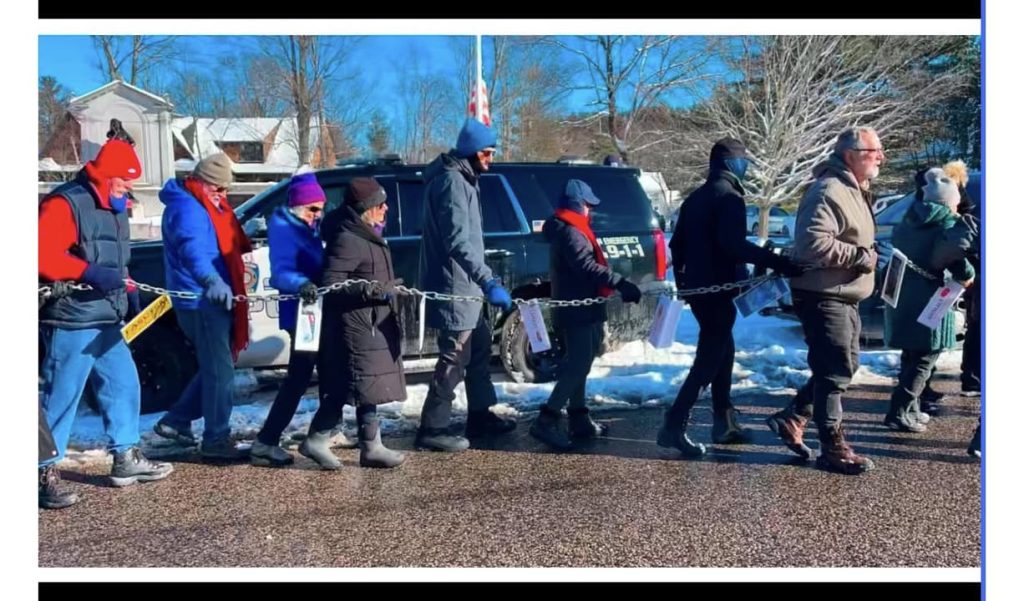 .
.
PEACE CHAIN DIRECT ACTION
CIVIL DISOBEDIENCE
2003 – 2025
“If you haven’t found something worth dying for, you are not fit to live”
– Martin Luther King, Jr.
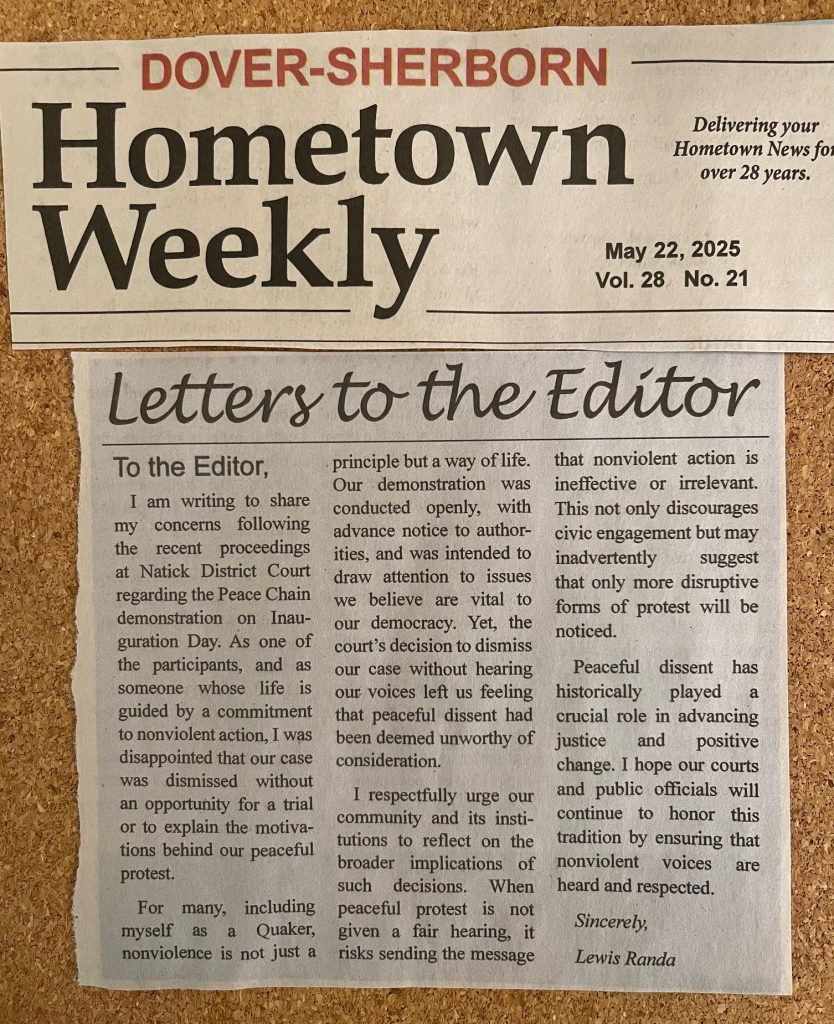

Civil Disobedience in a Time of National Crisis
Navigating Family Fears:
Activism and the Ripple Effect on Loved Ones
.
A Call to Conscience: Stand Together Against Militarism and Authoritarianism
CITATION/SUMMONS vs ARREST
Peaceful Civil Disobedience 

Request to Police Departments:
Issuing Citation/Summons Over Arrests for
Peaceful Civil Disobedience
We respectfully request that Police Departments adopt a policy of issuing citations/summons, rather than making arrests, for individuals engaging in peaceful, nonviolent civil disobedience when coordinated with law enforcement. This approach supports nonviolent principles, reduces community costs, and strengthens police-community relations.
Below are the key reasons for this recommendation:
- Alignment with Nonviolent Principles: Arresting peaceful demonstrators undermines the philosophy of nonviolence and may escalate tensions. Issuing citations allows protesters to convey their message without unnecessary confrontation.
- Cost Savings: Arrests require significant resources for onsite police coverage, processing, booking, and detention. Citations/summons save time and money, enabling law enforcement to focus on other priorities.
- Judicial Efficiency: Citations/summons streamline legal proceedings by reducing paperwork and court delays, ensuring cases are handled efficiently and effectively.
- Strengthening Community Trust: Respectful handling of peaceful protests demonstrates a commitment to civil rights and builds trust between law enforcement and the community.
- De-escalation of Conflict: Arrests can escalate tensions, while citations maintain order and focus on dialogue over confrontation.
- Constructive Legal Action: Citations/summons allow activists to challenge injustices through the courts without the stigma or disruption associated with arrests
By adopting this approach, Police Departments can uphold public safety while respecting constitutional rights and fostering positive relationships with the community. We look forward to collaborating on this matter for the benefit of all involved.
 A RULE OF THUMB FOR ACTIVISM:
A RULE OF THUMB FOR ACTIVISM:
Engaging the Three Branches of Government
To effectively engage in resistance within the U.S. political system, it is essential to address all three branches of government—executive, legislative, and judicial. Each branch offers unique opportunities to express opposition, foster change, and strengthen democracy.
- Executive Branch
Activism targeting the President (Commander in Chief) includes supporting or opposing candidates, donating to campaigns, voting in primaries and elections, protesting executive actions, and advocating for or against executive orders. Public demonstrations such as protests, rallies, vigils, and petitions can highlight critical issues like unconstitutional actions or threats to democratic institutions. The scope of potential actions is vast, so prioritize battles that align with your values. Leverage your network for greater impact—collaboration amplifies your voice.
- Legislative Branch
Engaging with the legislative branch involves campaigning for or against representatives and senators, voting in congressional primaries and elections, contributing to campaigns, and advocating for specific legislation. Writing letters, signing petitions, and making calls are effective ways to ensure your voice contributes to shaping policies that matter to you.
Remember: elected officials work for the public. It is our civic duty to hold them accountable and demand they represent our interests.
- Judicial Branch
While direct influence over judges and courts is limited, nonviolent civil disobedience provides a powerful way to engage the judicial system from within. Actions such as Peace Chain blockades or sit-ins lead to arrests or issuance of citations for “disturbing the peace” and court appearances—which are opportunities to highlight grievances and injustices within a legal framework.
Peaceful civil disobedience serves as a powerful — though controversial —means of challenging unjust laws and voicing opposition to unconstitutional executive orders and legislation. It often garners more media attention than traditional protests and, when employed creatively, can inspire others to take action. However, this form of activism demands personal sacrifice and a clear understanding of the potential risks involved.
Historical figures like Gandhi and Martin Luther King Jr. legitimized civil disobedience as a form of civic engagement. Be aware that outcomes may vary depending on political climates — don’t assume courts in blue states will be more lenient. Prepare for potential consequences while ensuring your actions are deliberate and meaningful.
Proportionality in Activism
Proportionality ensures that activist efforts are ethical, measured, and appropriate to the injustice being addressed. Balance disruption with effectiveness while maintaining moral legitimacy.
Key Principles of Civil Disobedience:
- Nonviolence: Avoid causing harm or infringing on others’ rights; violence undermines moral authority.
- Deliberation: Plan actions carefully with clear goals while minimizing excessive disruption.
- Acceptance of Consequences:
Be willing to accept legal penalties as a demonstration of respect for the rule of law while exposing injustice. When appropriate, invoke the necessity defense to position yourself, as a protester turned defendant, in a morally justifiable stance. The necessity defense asserts that an otherwise criminal act was justified because it was the only viable way to prevent a greater harm. As an affirmative defense, it acknowledges the act but argues that the circumstances made it necessary.
When considering your role in activism, think about proportionality. Casting a single vote may feel meaningful but represents one among millions of votes cast nationwide. In contrast, coordinated acts of peaceful civil disobedience—which leads to occupying court time—can have a disproportionate impact on the judicial system compared to individual votes.
For example: if 1% of voters (approximately 1.5 million people) participated in coordinated acts of civil disobedience nationwide, their collective impact could surpass that of their votes in influencing systemic change.
A Balanced Approach to Activism
By strategically engaging across all three branches of government—executive, legislative, and judicial—activists can maximize their influence and foster meaningful change. This balanced approach underscores how diverse forms of participation strengthen resistance movements.
At The Peace Abbey Foundation, we encourage peace activists to consider all three branches as worthy targets for their actions. Resistance is more critical than ever as efforts to dismantle federal agencies threaten the well-being of society’s most vulnerable members—the poor, elderly, underserved, and marginalized. Together, we can resist these forces and work toward a more just society.
A Final Note
Consider taking risks and committing personally to the causes you care about. Personal sacrifice not only demonstrates your dedication but also inspires creative expressions of conscience that can drive meaningful change and serve as an example to others.
Join the resistance because everyone’s involvement is our only hope to save our democracy.
PEACE CHAIN DIRECT ACTION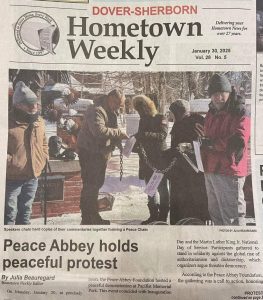
By Julia Beauregard
Hometown Weekly Editor
On Monday, January 20, at precisely noon, the Peace Abbey Foundation hosted a peaceful demonstration at Pacifist Memorial Park. This event coincided with Inauguration Day and the Martin Luther King Jr. National Day of Service. Participants gathered to stand in solidarity against the global rise of authoritarianism and dictatorship, which organizers argue threaten democracy.
According to the Peace Abbey Foundation, the gathering was a call to action, honoring Dr. Martin Luther King Jr.’s legacy while advocating for justice, equality, and freedom. Organizers highlighted the importance of peaceful protest as a means to safeguard democratic values and resist initiatives like Project 2025 and the MAGA agenda.
The demonstration featured twelve speakers who voiced concerns about issues they believe are under threat from the MAGA agenda and Project 2025. Topics included gun violence, healthcare, homelessness, civility, freedom of the press, animal welfare, capitalism, women’s rights, climate change, and religion. Protesters also condemned what they described as a rise in fascism, attributing its influence to policies associated with President Trump.
Lewis Randa, the founder and director of the Peace Abbey Foundation, emphasized the need for continued vigilance and activism to counter these perceived threats to democracy, “When President Trump took the oath of office, which he clearly has no intention of upholding, we presented 12 grievances that will be documented in court records as we advance our necessity defense. This defense asserts that our actions serve as a clear warning that our nation is heading toward fascism and authoritarianism.” These powerful speeches brought those who braved the freezing cold temperatures together as they stood closely to listen into their words.
After each speaker concluded their speech, they joined together to chain hard copies of their commentaries to a steel Peace Chain. Once the Peace Chain was fully assembled, Lewis Randa directed the protesters to move into the street, where they held the chain as an act of civil disobedience to amplify their message. Randa reminded participants that acts of civil disobedience do not need to be violent in order to be powerful.
More than a dozen participants received citations for civil disobedience after blocking Main Street in Sherborn. A trial date has yet to be scheduled.
Statement to ICE at the Peace Memorial Park
Together, let us uphold the values of inclusion and respect, ensuring that the Peace Memorial Park remains a refuge for all who seek solace and strength in our shared dedication to finding refuge in America. ![]()
PEACE CHAIN DISPLAY AT ABBEY COTTAGE

ACQUITTAL PROTEST IN SHERBORN
FEBRUARY 5. 2020
“Civil Disobedience is a sacred duty when the state becomes lawless and corrupt.”. – Mahatma Gandhi
On February 5th at noon, a group of local citizens gathered at the Gandhi statue in Sherborn to protest the impending Senate acquittal of Donald J. Trump without witnesses or evidence permitted.
Following the reading of the two Articles of Impeachment issued by the US House of Representatives, the group from MetroWest took turns stating grievances they had against the Trump Administration. Expressed concerns included civility, xenophobia, immigration, and climate to women’s rights, nuclear proliferation, gun control and the treatment of animals in society.
As the demonstrators moved into the street holding the long Peace Chain to unify them, a half dozen police officers stopped traffic as the protesters stood their ground until the third and final demand to retreat or be arrested was given. Lewis Randa, Director of The Peace Abbey, refused to obey the final order, as he had informed the police earlier that the peaceful protest would conclude with his arrest. ”Civil disobedience”, Randa said quoting Gandhi, “is a sacred duty when the state becomes lawless and corrupt.” Randa was arrested, booked and fingerprinted at Sherborn PD, and transported to Framingham District Court.
Following the reading of the charges by the State Prosecuting Attorney (disturbing the peace and disorderly conduct), Randa was allowed to speak directly to the Judge. Explaining the reason for his actions, he pointed out that the protest, which violated the law, was done in part to establish the necessity of testimony and evidence in a court proceeding, his own case serving as an example. “Witnesses and evidence are the pillars of our system of justice and are required in both impeachment trials and trials for civil disobedience”, said Randa.
Randa was released on his own recognizance. Pretrial court date was set for April.
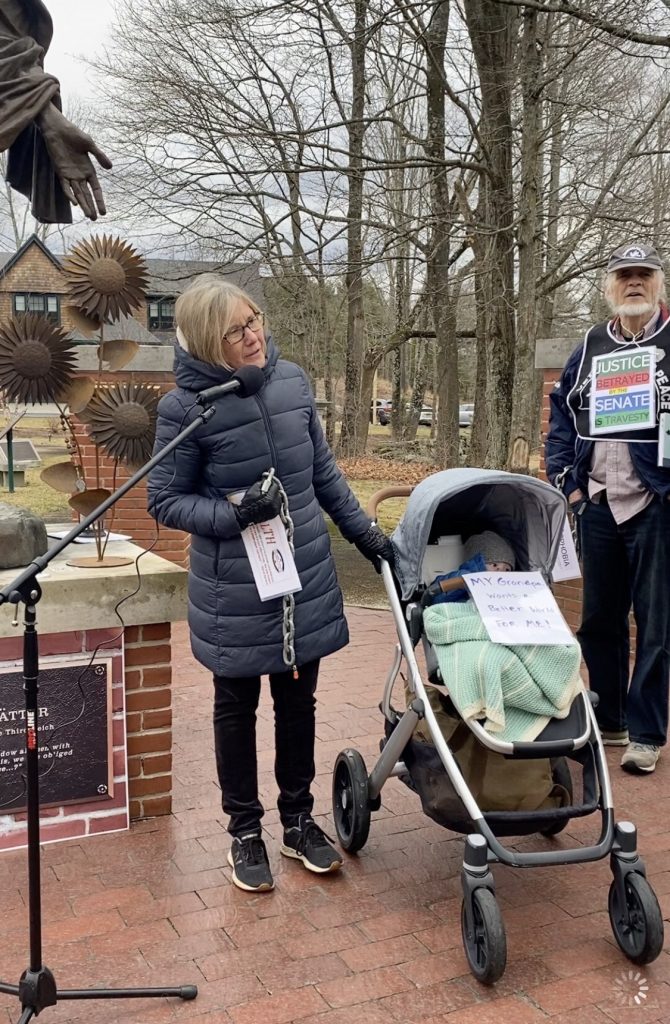
Meg Randa, with 4 month old granddaughter Colby addresses group before Peace Chain action in street.
REFUSE THE ORDER TO LAUNCH
Guest Column: Refuse the Order to Launch
By Lewis Randa
A Peace Chain Action
On Sunday, August 27, over two dozen activists, led by the Peace Abbey in Sherborn, marched from Natick center churches to the nearby Army base on General Greene Avenue to participate in the “Refuse the Order to Launch” demonstration.
Protesters held handmade REFUSE and SILENCE IS BETRAYAL signs, carried a banner provided by Mass Peace Action that reads, “No Fire, No Fury, No War on Korea” and were prepared to block the entrance to the Army Base to make a point. The message was clear: Refuse the Order to Launch.
The underlying reasons to “refuse” were outlined in the Peace Chain declarations, but in the back of everyone’s mind were the words uttered by Donald Trump, “If we have nuclear weapons, why can’t we use them?”
The group signed a petition to Vice President Michael Pence and the Cabinet to recognize that President Donald Trump has an observable mental disorder, witness his erratic and bizarre behavior, and to immediately initiate the 25th Amendment to have the President removed from office before we are cursed with a war that could very well leave our planet irreparably damaged and uninhabitable.
With a permit issued by the Natick Board of Selectmen and coordination with both the Town of Natick Police and US Military Police Departments in place, the group set off on foot by to the Soldiers System Center to express their fear, concern, and outrage over the prospects of a nuclear attack on North Korea.
Utilized at the Natick Army Base in 2003 to protest the US invasion of Iraq, the Abbey’s Peace Chain was employed this time as an expression of resistance. Following statements by protest organizers and the recitation of the prayers for peace of the major religions of the world, individuals stepped forward with sections of the Peace Chain in hand and read statements on the consequences of a nuclear war:
- Collapse of Civilization – Civil societies would collapse as political and economic systems fall into chaos and violence.
- Nuclear Darkness – The millions of tons of smoke that would result from nuclear war would spread to form a stratospheric cloud layer that would block sunlight for many years.
- Drastic Climate Change – In the absence of sunlight, surface temperatures on Earth could reach lows that rival the height of the last Ice Age.
- Precipitation Decline – Changes in weather patterns would result in a significant precipitation decline and eliminate growing seasons.
- Food Production – Extensive changes to the environment would affect our ability to sustain global food production.
- Eco System – Already stressed land and marine ecosystems would collapse.
- Ozone Depletion – Massive damage to the ozone layer would allow dangerous levels of Ultraviolet light to reach the Earth’s surface.
- Radioactive Fallout – Enormous amounts of radioactive fallout would be generated and spread both locally and globally.
- Species Extinction – Without food and a thriving habitat, human beings and other species would not survive long, becoming extinct.
- Ultraviolet Rays – It would be impossible for many forms of life on Earth to survive increases in UV light, massive radioactive fallout, and releases of toxins and industrial chemicals.
- Stratosphere – Millions of tons of smoke in the stratosphere would cause daily temperatures in the largest agricultural regions to drop below freezing for decades.
- Global Suffering – The detonation of a nuclear weapon would result in vast and terrible suffering that would affect all living things and last for lifetimes.
Once the Peace Chain declarations were read over a megaphone into the military base and the chain links assembled, the group, which ranged in age from 5 to 75, walked the Peace Chain in to the restricted area of the military base. Facing army police in respectful silence, the protesters prayerfully gathered their thoughts, then humbly stepped over flowers they had placed there and trespassed on federal property. They were told to cease and desist.
Everyone, as planned, dropped the Peace Chain and stepped back onto town property except for myself. I continued walking the Peace Chain forward to a point where I was confronted by Federal Police officers and informed that I could be charged with State and Federal offenses if I did not immediately leave the restricted area. I refused. I felt strongly that if I was calling on the military to refuse the order to launch, I must, in turn, refuse the order to leave. I was arrested and taken to the Natick Police Headquarters for booking.
I had planned , in organizing the action , to perform civil disobedience, face arrest, refuse bail and spend the night in jail to prayerfully reflect on the dire consequences of a nuclear war, which, with no diplomatic efforts in place to de-escalate the crisis, appears increasingly likely.
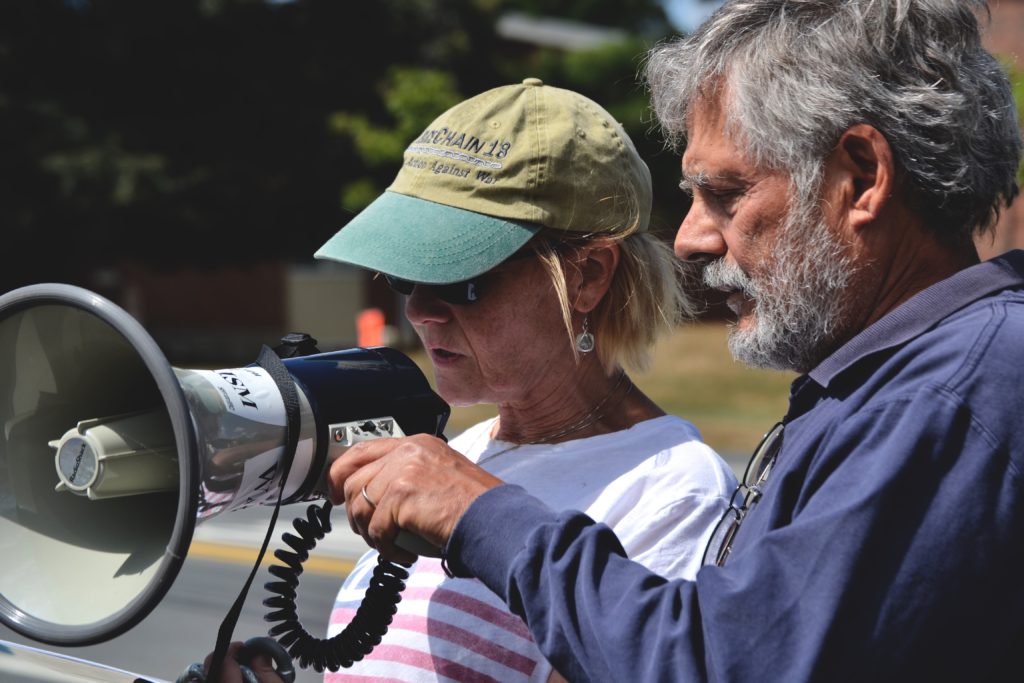
Meg Randa delivers nuclear warning at the Peace Chain action at the entrance of the Natick Army Base.
I was brought to Framingham/Natick District Court the following morning where my wife Meg and Peace Movement attorney Greg Barison awaited my arrival to face trespassing charges.
After several hours in the holding cell beneath the courtroom, I was called to the bench. I agreed to pay court costs and the case was dismissed.
As tensions mount following the annual month-long US – South Korean military exercises off the coast of North Korea, (which are intended to intimidate and provoke the mentally unstable North Korean leader, Kim Jong-un), the world watches with bated breath.
The world is cursed by nuclear weapons. The time to act is now.
Pray as though everything depends on God. Resist as though God depends on us for everything.
Lewis Randa, Founder
The Peace Abbey
THE NUCLEAR RESISTER
On Sunday, August 27, more than two dozen people joined a Peace Chain demonstration at the US Army Soldier System Center in Natick, Massachusetts. With signs denouncing nuclear war, they walked from Natick Common to the entrance of the U.S. Army Natick Soldier System Center to call upon the military to refuse any order to launch a nuclear attack on North Korea. As they gathered on federal property with the Peace Chain, which has a storied, decades-long Hanging from the chain were 12 large tags explaining “why nuclear war is not an option for the holder of the nuclear codes, unless, however, the President is mentally disturbed.”
“Our government has no sane option but to negotiate with North Korea to prevent a human, environmental, moral catastrophe of our own making,” their statement read. “We must remember the devastation in North Korea when between 1950 and 1953, American war planes carpet bombed and burned to the ground nearly every city and town in North Korea. They haven’t forgotten and their fear and hatred towards the United States continue unabated.
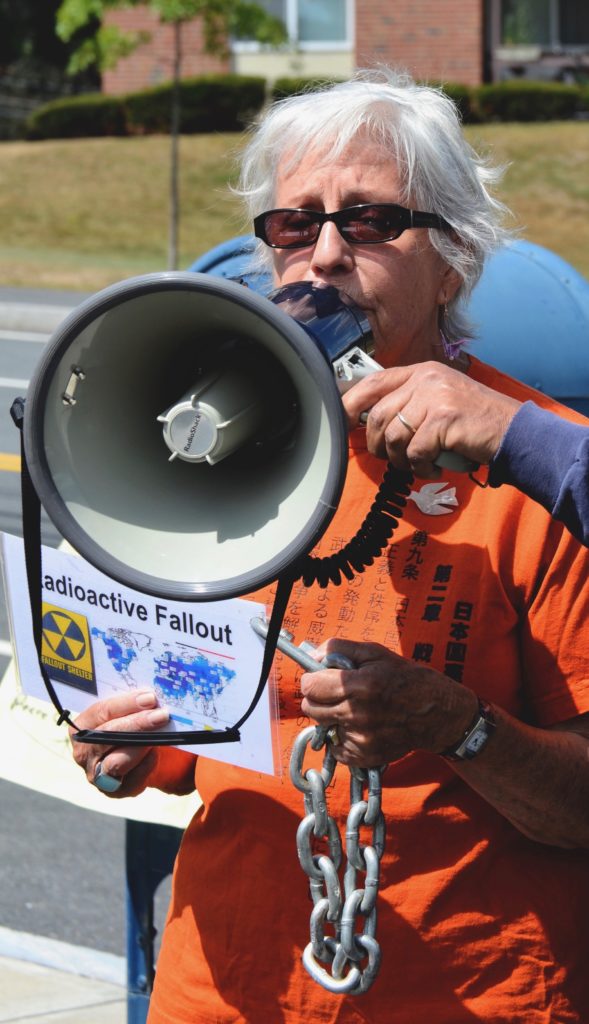
Dot Walsh, Abbey Peace Chaplain, delivers nuclear warning at Peace Chain action at the front entrance of the Natick Army Base.
“We have signed a petition to Vice President Pence and the Cabinet to recognize that President Donald Trump is mentally disturbed, witness his erratic and bizarre behavior, and to immediately initiate the 25th Amendment to have the President removed from office before we are cursed with a war that could very well leave our planet irreparably damaged and uninhabitable. Through the Peace Chain Action we will specifically spell out what a nuclear war would mean to a President who actually asked the question, ‘If we have nuclear weapons, why can’t we use them?’”
When they arrived at the base entrance, the twelve Peace Chain nuclear declarations were read aloud and the chain was brought in front of the gates at the Army Base. Lewis Randa was arrested when he refused to leave the entrance, and he spent the night in jail. The following day at Framingham District Court, Randa was fined $100 and the case was dismissed.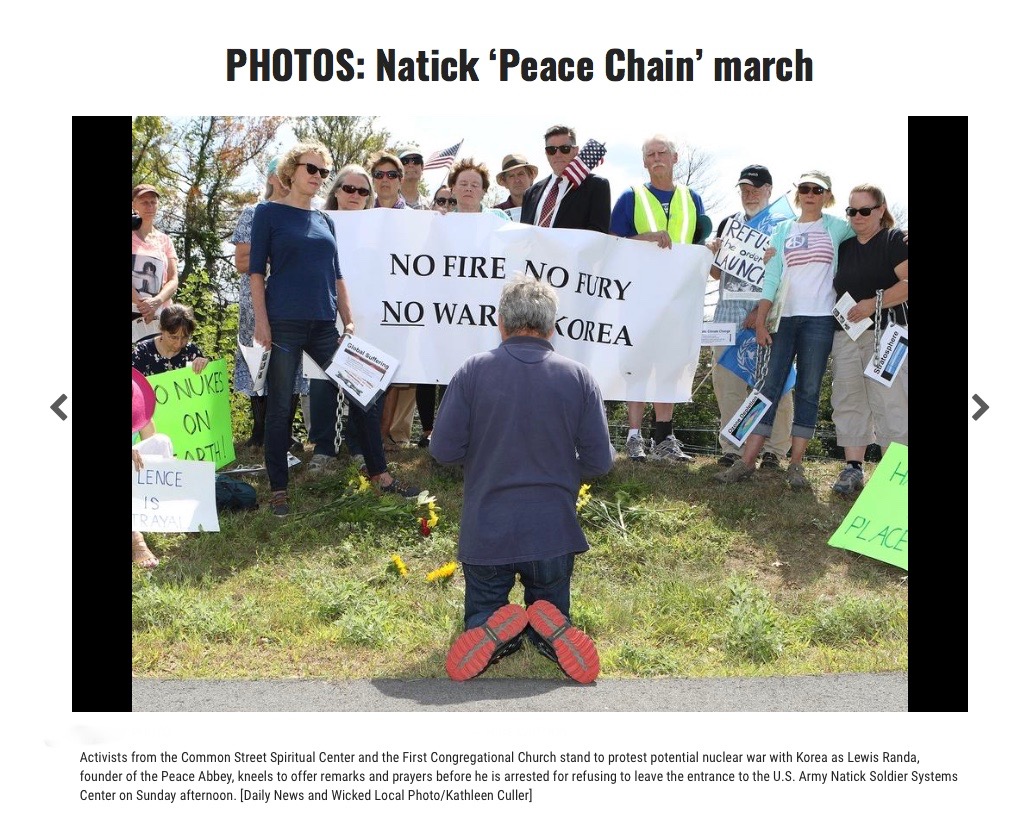

Report on “Refuse the Order to Launch” action
Just a quick update following the “Refuse the Order to Launch” demonstration at the Natick Army Base on Sunday, August 27.
The protest march from Natick Center was important for reasons that extend beyond making a public statement against a potential nuclear strike against North Korea. For our young college intern, Maddie Walters, who worked to organize the action, it was an opportunity, following two horrific years of recovery from a near death accident in high school that left her with a serious brain injury, to take a stand both literally and figuratively. Her recovery has been miraculous — and her one-mile protest walk from Natick center to the army base was a poignant testimony, not only of her fear of nuclear war but a spirited demonstration of her physical recovery and the resilience of the human body and the human mind. Maddie’s impact on others is profound; her contribution to peace is enormous. We wish her well as she enters her freshman year at Lasell College in Newton.
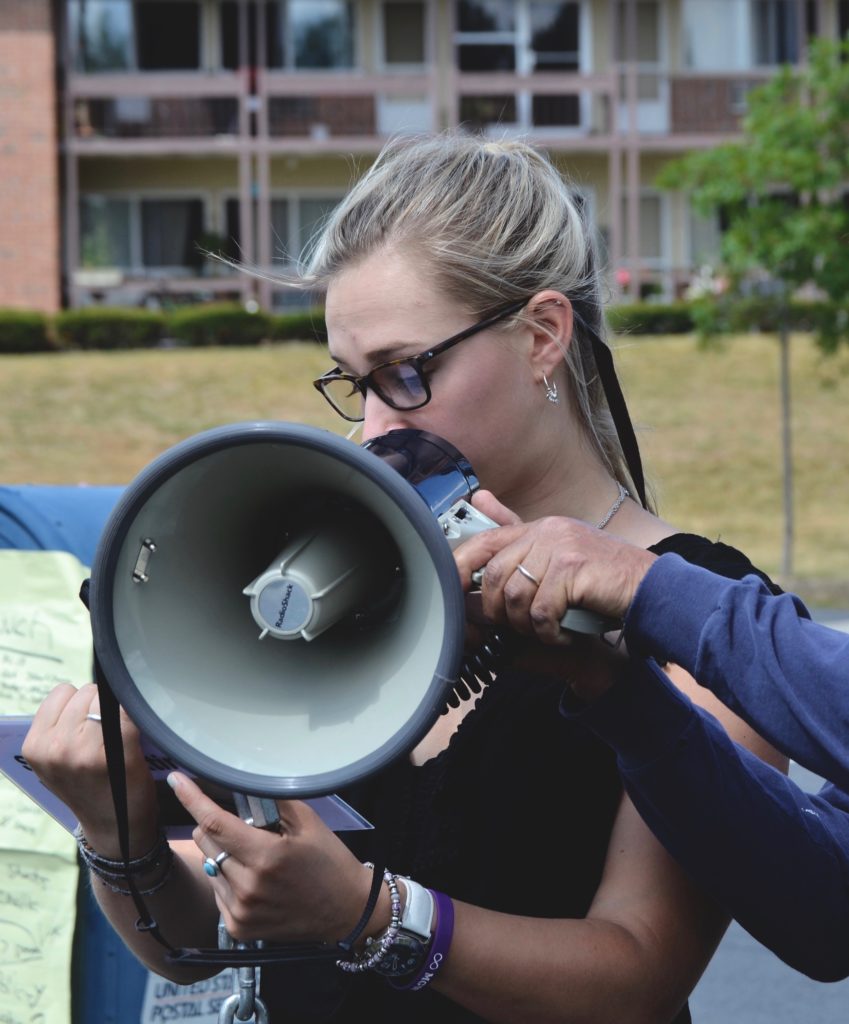
Lasell College intern, Maddie Walter, delivers nuclear warning on species extinction at the Natick Army Base.
I wish to thank? the activists who read Peace Chain statements about the horrors of nuclear war, and extend my debt of gratitude to the ?members of the Common Street Spiritual Center and the First Congregational Church, ?without whom, ?the action ?would not have ?attracted long-time activists from the area and several individuals who are new at taking such ?actions for peace. The Natick Board of Selectmen that authorized the march did so trusting that an action organized and led by the Peace Abbey would be nonviolent and peaceful and would be conducted according to agreed upon standards of conduct on town property. Mass. Peace Action provided the NO WAR banner and many marchers brought homemade signs that personally expressed their concern and outrage. For those who were part of the demonstration, it was impressive to witness the professional, measured and thoughtful response from both the Natick Police officers and the Federal police stationed at the Natick Army base. And I am grateful to report that such was the case both at the Natick Jail and at the Framingham District Court.
FYI: Following my arrest, I declined bail, preferring to spend the night in jail in prayerful reflection while rereading the book “I REFUSE” by J.K. Osborne. (I first read this powerful memoir of a Vietnam war resister during a fast which led to my discharge from the army as a conscientious objector in 1971.) The following morning I was transported to Framingham/Natick District Court where my wife Meg and peace movement attorney Greg Barison awaited my arrival. The Judge reduced my fine from $510. to $100 and dismissed the case.
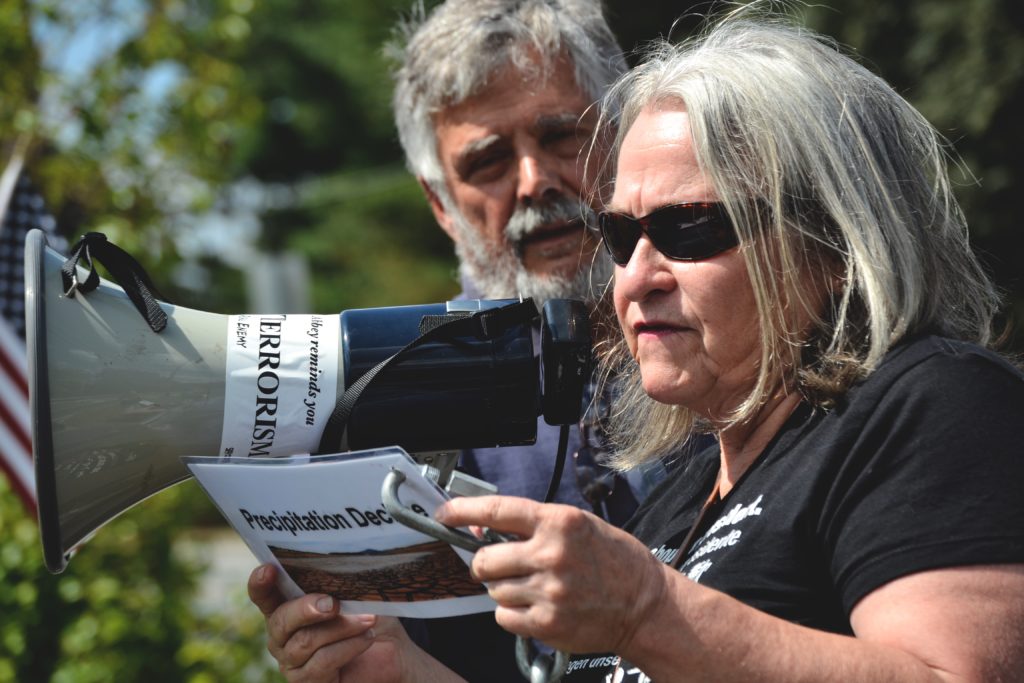
Carol Coakley, Chair of MetroWest Peace Action, delivers nuclear warning at the Peace Chain action at the Natick Army Base.
In the words of attorney Barison: “No gesture for non-violence, however small, no stand for peace, however modest, goes for naught.”
Please join us at Noon on October 24th, United Nations Day at the Pacifist Memorial in Sherborn, MA ?as we honor Retired Major Harold Hering who was discharged from his military career for asking the question: “Are there checks and balances on the President when ordering a nuclear strike?” That was in 1973 and Richard Nixon was president. Decades later, we find ourselves at the gates of the military installation in Natick ?asking the same question. It’s 2017 this time, and Donald Trump is president. Some things never change.
Pray as though everything depends on God. Resist as though God depends on us for everything.
PEACE CHAIN SAGAMORE BRIDGE PROTEST
CLOSE PILGRIM NUCLEAR POWER STATION NOW!
With the Peace Chain on Sagamore Bridge, despite the rain cancelation of the scheduled protest to demand the closing of Pilgrim Nuclear Power Station. The twelve Peace Chain sections were linked to the railing of the bridge across Cape Cod Canal. Each section had the name of the towns that would immediately be effected if the core reactors failed at the facility.
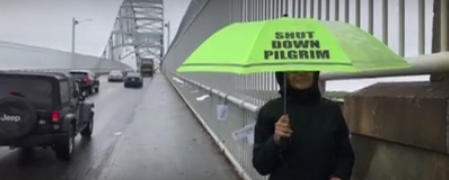
Meg Randa protests as part of the Peace Chain action on the Sagamore Bridge demanding the closing of Pilgrim Nuclear Power Plant.
PLYMOUTH — Pilgrim Nuclear Power Station leads the nation’s fleet of 99 reactors for incidents or conditions over the last 40 years that could have led to core damage and an accompanying release of radiation, according to a division of the Nuclear Regulatory Commission that conducts risk analysis.
While not among the 11 reactors on the 2016 list published June 8 by the NRC’s Division of Risk Analysis, Pilgrim has made the list for “accident sequence precursors” 23 times since 1980.
Such precursors are defined by the NRC as observed events or conditions that, when combined with one or more factors such as human error or equipment failure, could result in damage to the reactor’s core and a massive release of radiation.
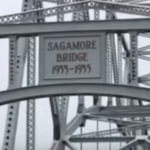 “The accident sequence precursors are like golf scores, in that the low score wins,” said David Lochbaum, director of the Nuclear Safety Program for the Union of Concerned Scientists.
“The accident sequence precursors are like golf scores, in that the low score wins,” said David Lochbaum, director of the Nuclear Safety Program for the Union of Concerned Scientists.
While the 45-year-old Plymouth plant, owned by Entergy Corp., was on the annual list only four times in the past 20 years, all four of the potentially dangerous incidents have been recent, occurring since 2011.
In May 2011, operators made a series of faulty judgments on power levels as they powered the reactor back up. Those failures to properly assess reactor activity ultimately triggered an automatic shutdown. The situation was judged by federal regulators as an accident sequence precursor.
The other three events — two in 2013 and one in January 2015 — involved unplanned shutdowns following electrical problems in the plant’s switchyard during storms. Contributing to those incidents were operator error and equipment failures. Short circuits in the switchyard at Pilgrim have been a recurring problem, researchers noted in their report, involved in 13 of the 23 accident sequence precursor total.
NRC spokesman Neil Sheehan said those three recent weather-related events at Pilgrim and the plant workers’ response to those events “are a significant contributor to Pilgrim’s placement in Column 4.”
Since the fall of 2015, Pilgrim has been ranked by federal regulators in a performance category just one step above ordered shutdown, based on standards set by the Nuclear Regulatory Commission. Because of its ranking as one of the three worst performers in the country, Pilgrim was required to undergo 12,000 hours of federal inspection last year.
Lochbaum called the nature of the Pilgrim events on the accident sequence precursor list over the years “not surprising.”
“The list includes safety relief valve problems, losses of offsite power, and high pressure coolant system failures — the same problems that factored in recent Nuclear Regulatory Commission findings and sanctions,” he said.
Risk analysts began their 2016 study by scrutinizing the 350 event reports turned in to the NRC by reactor licensees during the year; they whittled that list to 63 that needed further analysis. Two of those were incidents at Pilgrim, which were eventually screened out.
A third incident at Pilgrim was not considered for the list because it is still being evaluated.
The first incident dates back to April 12, 2016, when workers took one of two emergency generators offline for maintenance, believing the second was in good working order. More than 25 hours after shutting down the first generator, a worker noticed water leaking across the floor from the second. The leak was caused by stress corrosion and the generator was declared inoperable.
The second incident, which also occurred in April 2016, involved relay tests that were done while the reactor was powered up instead of in cool shutdown, as technical standards called for.
A third incident, which will be analyzed by inspectors after more information is provided by Entergy, involved a leaking relief valve that put one of the emergency generators out of service due to low gearbox oil.
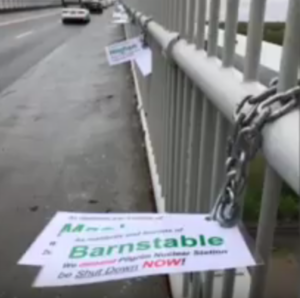 Spokesman Patrick O’Brien said Entergy has been hard at work addressing plant deficiencies. “The events documented in this analysis have been thoroughly evaluated by Entergy and by the Nuclear Regulatory Commission through its various oversight processes,” wrote O’Brien in an email to the Times. “Corrective actions to address the causes are consistent with the station’s ongoing efforts to strengthen our performance.”
Spokesman Patrick O’Brien said Entergy has been hard at work addressing plant deficiencies. “The events documented in this analysis have been thoroughly evaluated by Entergy and by the Nuclear Regulatory Commission through its various oversight processes,” wrote O’Brien in an email to the Times. “Corrective actions to address the causes are consistent with the station’s ongoing efforts to strengthen our performance.”
“Entergy also made a significant investment in equipment reliability improvements” during the plant’s recent refueling and maintenance outage, O’Brien said.
A look at the accident sequence precursor events over the past 10 years “reveals no statistically significant increase or decrease in trends,” the report notes. A review of the past 20 years, however, reveals two statistically significant trends: more occurrences in boiling water reactors (like Pilgrim’s), and more precursors that are related to emergency diesel generator failures.
Follow Christine Legere on Twitter: @ChrisLegereCCT.
INAUGURATION DAY PEACE CHAIN ACTION
January 20, 2017
TREASON IS EASY TO RECOGNIZE
“Russia, if you’re listening, I hope you’re able to find the
30,000 emails that are missing.” Donald Trump

Parents and students from the Life Experience School participate in demonstration against Trump presidency on Inauguration Day.
TRUMP INAUGURATION DAY DEMONSTRATION
Peace Chain Grievance Presenters:
Civility – Lewis Randa
Gun Violence – Phil Lussier
Xenophobia – Cindy Stewart
Women – Miriam Greenspan
Nuclear – Amy Lussier
Religion – Dharam Singh
Immigration – Phyllis Bobillo
Health – Betsy Lussier
Capitalism – Roger Gottlieb
Animals – Louise Coleman
Climate – Bill Holcombe
Disabilities – Maureen Gaynor
*
Public Speakers:
Courtland Woods
Esther Gottlieb
Peggy Barton
 Case dismissed against Sherborn peace protesters
Case dismissed against Sherborn peace protesters
Denied a chance to air their grievances about President Donald Trump in Natick District Court on Monday, four protesters arrested in January in Sherborn gathered outside the courthouse to share them with their supporters.
“The validity of my/our necessity defense, whether acknowledged by the court or not, is our clarion call to charge Donald Trump with what amounts to treason,” said Lewis Randa, 69, of Duxbury, the director of the Life Experience School and the Peace Abbey Foundation. “We allowed Donald Trump to get away with publicly urging a foreign government, Russia, to help him defeat his opponents during the U.S. presidential election.”
On Jan. 20, Sherborn Police arrested Randa, along with Courtland “Courty” Woods, 54, of Medfield; Maureen Gaynor, 49, of Greenville, Rhode Island; and William Holcombe, 68, of East Sandwich, during a protest at the Peace Park in Sherborn. All four were charged with disturbing the peace after they all gathered in the road holding the Peace Abbey Foundation’s “peace chain.”
The charges were dismissed against Gaynor that day on $150 court costs. On Monday, the remaining protesters, were at Natick District Court for a pretrial conference. Prosecutor Wendi Safran filed a nolle prosqui against all three, essentially moving to dismiss the case. Over Randa’s, Woods’ and Holcombe’s objection, Judge Lynn Coffin Brendemuehl dismissed the case.
“We wanted it to go to trial,” said Randa. “We didn’t want it dismissed. We felt the message we brought to court needed to be voiced in court.”
However, Brendemuehl denied their request to read written statements in court, so the group gathered outside.
Holcombe describd himself as a Quaker with a “deep and abiding concern for the health of the planet.” He said Trump is not doing enough and doesn’t seem to care or take environmental problems seriously.
“Instead, he denies science and appoints a climate science-denying coal burner to head the EPA (Environmental Protection Agency),” said Holcombe. “To me, this seems beyond bizarre and utterly catastrophic. Given all this, business as usual, including demonstrations against the new administration, is not nearly enough. Rather, I feel compelled to take the strongest non-violent action I can to protest the planetary life threatening nature of Trump’s words and actions.
Gaynor, who is disabled and uses a wheelchair and spoke using a tablet, decried what she said was how Trump has mocked the disabled.
“Not all people with disabilities can speak up and defend themselves,” she said. “We were the voice for the voiceless on Inauguration Day.”
Although the current case is over, Randa said he and others will not stop protesting and trying to raise awareness as long as Trump is president. “We will continue,” said Randa. “This won’t be the last time you’ll see us.”
(A special thank you to the Sherborn Police Department for the professional handling of the Anti-Trump demonstration on Inauguration Day, January 20, 2017.)
 Sherborn protest a
Sherborn protest a
‘show of moral indignation’
By Lewis Randa
Peace Abbey Founder
Dover Sherborn Press
February 9, 2017
On Inauguration Day, as Donald Trump took the oath of office as President of the United States in Washington D.C., I and several dozen peace and social justice activists gathered at the Gandhi Statue in Sherborn to express our outrage; and for a small group of us, to take matters into our own hands.
Our goal was to simultaneously denounce racism, xenophobia, Islamophobia, sexism, misogyny, climate change denial, and white supremacy, which the new Trump administration gives voice to as it takes control and redirects the values of our nation. For four of us, this meant bringing the Peace Chain and its 12 grievances onto the street and being arrested, handcuffed, booked, and arraigned in district court for “disturbing the peace.”
In the eyes of many, we appear to be but sore losers: And to be completely honest, they are right. How could we be otherwise? Losing our nation as the most tolerant, accepting, multicultural place on Earth is tough to witness, and is not something any of us should take lightly.
For two individuals who chose to be arrested, Courtland Woods and Maureen Gaynor, it meant finding the courage to stand up against the newly elected President who ridiculed and mocked a disabled person, like themselves, then denied that’s what he was doing. It meant not accepting the prevailing “wait and see” attitude but announcing with their bodies that they aren’t about to let an authoritarian demagogue reverse decades of social progress made by both Democratic and Republican administrations without a fight. It meant being vulnerable to a degree most people cannot fathom, and taking risks that very few are willing to take to stand up against fascism.
Those present at the foot of the Gandhi statue and those of us taken into custody were not so naive to think that a demonstration or an act of civil disobedience would right any wrong or make a difference in and of itself. The act did, however, appeal to a higher principle than the law being violated, (which was temporarily occupying a portion of one lane at the fork in the road of Washington and Main streets). The guiding principle behind our arrests reflects our moral indignation and a personal willingness to be part of a national resistance movement when the treasured values of our nation are undermined, denigrated and reversed. The parallels between Trump’s fascist rhetoric, unconstitutional policies, dictatorial style, and that of the Third Reich are undeniable and frightening. Trump is unhinged, amoral, and a real and present threat to our American way of life.
When a threat to our nation’s commitment to long-cherished social justice, religious equality, and core social values is perceived and taken seriously, American history has shown that civil disobedience is not only proper and just but required and necessary. Taking one’s grievances to the courtroom through civil disobedience assures that one’s point of view is officially taken into account, reported on, and becomes public record. But as we know, there is a price to pay. Gandhi and King and countless other activists throughout history were no strangers to handcuffs, jails, and courtrooms. The Nuremberg Trials, which occurred a year before my birth in 1946, cast a long, dark shadow across the history of fascism and is with us today. Too little too late has always given dictators the time they need to subvert a country’s constitution. With the election of Donald Trump, history is repeating itself – and tragically – this time we are on the wrong side of history.
To those unfamiliar with what took place on Inauguration Day in Sherborn, you should know that I met with the Sherborn Police a week before the demonstration and walked through every detail of the protest, including the act of civil disobedience. It’s hard to imagine arrests conducted with greater sensitivity, care, and professionalism than was demonstrated by Sherborn Police and accompanying State Police officers. Law enforcement was introduced to each person who planned to engage in civil disobedience beforehand to assure that the demonstration would unfold in an orderly fashion, be conducted safely, and be entirely peaceful. And that it was. In the Gandhian tradition of nonviolent, civil disobedience, this was an act of “assuring the peace” not “disturbing the peace,” though we accept the charge brought against us and are prepared to defend ourselves in court.
As people visit the Gandhi statue and read the bronze plaques which honor great pacifists in history, it is my hope that children and adults alike, find in the course of their lives opportunities to take risks for their country and the world. This is but a mild way of saying what Martin Luther King, Jr. said in 1968 when I was a student at the University of Iowa: “If you haven’t found a reason to die for, you aren’t fit to live.”
Lewis M. Randa, Founder
The Peace Abbey
METROWEST DAILY NEWS
“CHAIN REACTION TO PRESIDENT TRUMP”
By
SHERBORN – As President Donald Trump’s inauguration ceremony wrapped up Friday in Washington D.C., four people moved into a street in Sherborn to be arrested.
The arrests were part of a peaceful protest of Trump’s presidency, held at the Peace Abbey in Sherborn. Dozens, including attended the demonstration, including several with disabilities.
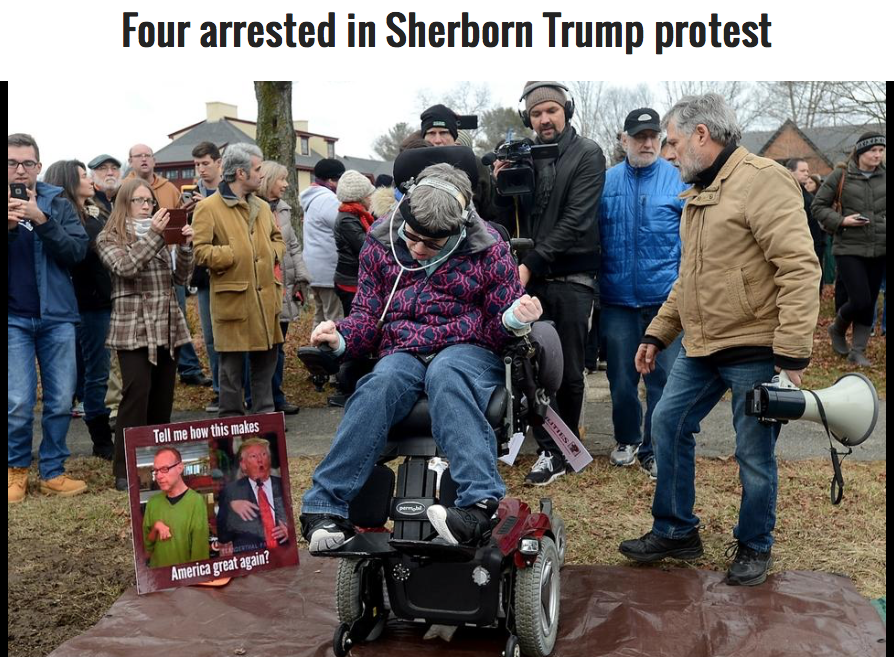 “I understand why people don’t want to think about it,” said Louise Coleman, who protested, but was not arrested, “but if you don’t think about it, it doesn’t change.”
“I understand why people don’t want to think about it,” said Louise Coleman, who protested, but was not arrested, “but if you don’t think about it, it doesn’t change.”
After a reading of grievances against Trump at the foot of a statue of Mahatma Gandhi, Maureen Gaynor, who uses a wheelchair, led protesters to the street, her hand cuffed to the Peace Abbey Foundation’s “peace chain.”
Fellow protesters held links of the chain and moved into the road, where state and local police waited, stopping traffic. Officers warned protesters to step back – at which point all except the four did so – gave the warning twice more, then arrested Gaynor and three others.
Protesters cheered, clapped, and sang as Gaynor was lifted into a Department of Correction handicap van.
 “I’m here because Donald Trump made a speech about disabled people, and it really kind of hurt,” Ian Murawski said. “I feel if he will listen to us, this world will change for the better.”
“I’m here because Donald Trump made a speech about disabled people, and it really kind of hurt,” Ian Murawski said. “I feel if he will listen to us, this world will change for the better.”
Grievances read aloud before the arrests included xenophobia, losing ground against climate change, disrespect of women and people with disabilities, immigration intolerance, and the dangers of nuclear power. As each grievance was read, a length of the Peace Abbey Foundation’s peace chain was attached to the statue.
“I work with a lot of asylum seekers and refugees, and I have a daughter who’s disabled who’s 33,” Martha Guevara said, “and I’m concerned about all of the issues discussed.”
Sherborn Police Chief Richard Thompson said Peace Abbey President Lewis Randa met with police prior to the demonstration. A tarp was even laid down over the mud between the grass and the road, making it easier for those in wheelchairs to cross onto a public way.
“We took them into custody without any incident,” Thompson said, calling the protest “very peaceful.” “(Randa) met with us about a week ago told us what his plans were, that he and some other folks were looking to protest the inauguration and the protest had to do with people who had certain disabilities.”
Thompson said traffic wasn’t backed up too far for the few minutes police blocked the road, estimating less than 20 cars in both directions.
“I think if there’s enough of them (protests) going on, that will definitely be noted,” demonstration attendee Patino Vazquez said. “All of it together, I think that all adds up to something.”
Several protesters said such events can make an impact if enough of them happen.
“We have to come out of our inaction,” protester Dharam Singh said. “We’ve been lulled into a level of comfort by these years, and we have to come together.”
The four arrested were Lewis Randa, 69; Courtland Woods, 54; Maureen Gaynor, 49; and William Holcombe, 68.
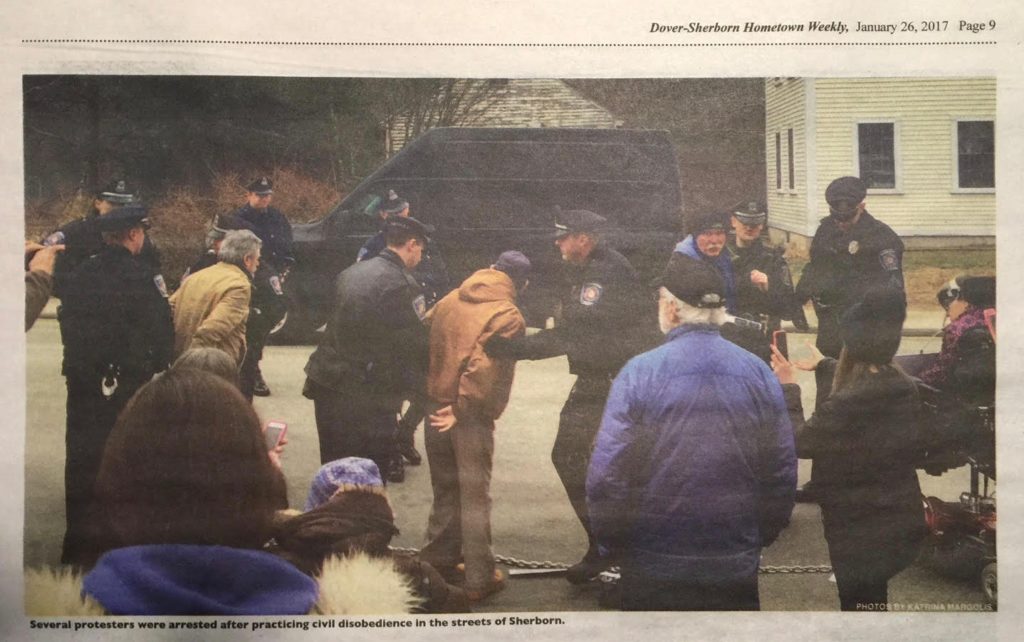
From left to right – Randa, Woods, Holcombe and Gaynor arrested for civil disobedience during Inauguration Day demonstration at the Peace Abbey.
*
All four were charged with disturbing the peace, which they did when they stepped into a public way, Thompson said. All were arraigned Friday, and all except for Gaynor were released without bail, and expected back in court March 6 for a pretrial conference.
Judge Jennifer Stark found Gaynor responsible, but decriminalized the charge. Gaynor has to pay $150 in court costs.
——————————————-
 HOMETOWN DAILY REPORTER
HOMETOWN DAILY REPORTER
PEACE CHAIN CIVIL DISOBEDIENCE IN SHERBORN
In Sherborn, protesters gathered to mark the Inauguration
January 25, 2017
By Katrina Margolis
On Friday, January 20, the 45th President of the United States was sworn into office. The election leading up to his victory was one of the most divisive in US history. However, President Trump’s inauguration did not mark end of these strong feelings. All across the country, citizens held inauguration protests, and Massachusetts was no different. Members of the Peace Abbey and general public of Sherborn and the surrounding towns gathered at the Peace Memorial to express how they felt about, in the words of a protester: “[The] highest office in the land behind held by someone who mocks people with disabilities and has sought to spread sexism, racism, xenophobia, hatred, fear and division in America.”
The gathering began with individual community members reading pre-written explanations as to why they disagree with what President Trump’s stance on various issues. These included women, bigotry, health, capitalism, animals, climate, disabilities, religious tolerance, and nuclear power. Each topic had a printed sign, which was then attached to a piece of a chain. As each topic was read, the pieces were joined together to create a larger chain.
The topic of women’s rights was particularly poignant, considering the national Women’s March that was held the following day. “He is a self-professed sexual predator who has done all he can to try to lead us backwards to a time when the only accessible roles for women were as wives, breeders and servants,” one community member said. “Women love our country and the world, we recognize that Trump does not see us as human. We are mobilizing our forces. Trump cannot trample on our bodies or our rights.”
After the topic of women’s rights, a man from Millis spoke regarding religious freedom. “It is not religion of any kind in any place that ought to be opposed, but the bigotry, hatred, and violence, just as we oppose these same things when they come from voices that are secular,” he said. “We oppose a ban on particular religious groups.”
A number of those in attendance had disabilities, making the topic that much more poignant. One woman spoke regarding her own disability and her concerns with President Trump. “I wonder if Trump and I were in the same room, would he even see me as a person?” she mused. “I believe he would do anything he could to escape and get out of the room as quickly as possible.” This same woman led community members in a march from the peace memorial to the street. A group of twelve or so police officers awaited them.
“If you do not plan on practicing civil disobedience, get out of the road now!” one man said. After a warning, a handful of community members were arrested for disturbing the peace and being in the road.
Faith, a community member in attendance, said: “As an active member of Pax Christi, I am very concerned about the bigotry that I see coming into office.”
There can be no doubt that these community members have made their voices heard.
————————————————————
– QUAKER EARTHCARE WITNESS
QUAKER EARTHCARE WITNESS
Seeking emerging insights into right relationship with
Earth and unity with nature.
PEACE CHAIN AND GANDHI STATUE BLOCK ENTRANCE TO
GOLDMAN SACHS
October 28, 2010
By Lewis M. Randa
*
It was quite a sight indeed. A nine-foot statue of Gandhi, flanked by police and security guards, was blocking the entrance to the Goldman Sachs offices in Boston on Thursday. Intended as a gift to be placed in the hallway as a warning against the evils of greed, the statue ended up being rejected and then used to close down the entrance to the building. Hanging off the wrist of the statue was a large poster with Gandhi’s words: “The World Holds Enough for Everyone’s Need, But Not for Everyone’s Greed”.
Students from the Life Experience School and members of the Peace Abbey in Sherborn, stood their ground as we moved the Gandhi statue inch by inch toward Boston Police officers and Goldman Sachs security guards. Slowly and thoughtfully we made our way from the sidewalk to the center revolving door at One Twenty-Five High Street in the financial district of Boston. Despite warnings from police to stop advancing the statue toward the doorway, it finally was inserted in place. For the next couple of hours, the traffic of Wall Street greed, as represented by the unethical business practices of Goldman Sachs, had to find another way in.
Entering the main entrance required not only getting around Gandhi and through locked doors, but also stepping over a long, out-stretched PEACE CHAIN with tags from the Peace Abbey that stated the major religions of the world; Hinduism, Buddhism, Jainism Islam, Sikhism, Baha’i, Shinto, Native African Religions, Native American Religions, Zoroastrianism, Judaism, and Christianity, all abhor greed. The American religion, Capitalism, could make no such claim, however; as greed holds sacramental status on Wall Street. Don’t forget that we have “IN GOD WE TRUST” on our greenbacks for one reason and one reason only. Let’s stop kidding ourselves and demand the end to unbridled greed on Wall Street, for where Wall Street goes, so goes the world.
Committed and determined, this conscientious band of both able-bodied and disabled peace activists sought (by blockading the entrance to the Goldman Sachs office with the likeness of Gandhi), to demonstrate their utter outrage over the sacking of the economy by the most notorious group of Wall Street barons greed ever created. Many of the protesters had just come from seeing the film “INSIDE JOB” and were now well-versed on how Goldman Sachs and other Wall St.firms destroyed the economy of this country and, sadly, the world.
Through a Ponzi scheme that mixes and matches predatory, subprime mortgage loans and credit card and college tuition debt with commodities and derivatives, Goldman Sachs packaged, sold, insured through AIG, then bet against the very financial products they marketed. Their windfall, and the eventual collapse of the economy, were a certainty, as with all Ponzi schemes. We now have a Wall Street Government that makes a mockery of free enterprise.
During the two hours Gandhi blocked the entrance, hundreds of office workers, tourists, and local Bostonians took photos with their cell phones of Gandhi blocking the doorway and sent them across the internet. A tourist from China, who marveled at such a peaceful protest and the awe-inspiring sight of a statue of Gandhi used for such purposes stood and watched. He then commented to Dot Walsh, Abbey chaplain, (who was addressing passersby), “I’ll send this right now to everyone in China”, as he snapped a shot of the protest with his cell phone.
In a day and age when instant communication is global, demonstrations such as this one at Goldman Sachs serves to remind everyone that each day we fail to raise our voices against injustice, we miss an opportunity to reach across the globe with a message of hope and struggle, solidarity and justice. Nonviolent civil disobedience was thought to be necessary at Goldman Sachs when the action was planned but wasn’t necessary. A picture, we know, is worth a thousand words, and thanks to cell phone cameras, the equivalent of millions of words went out through the image of Gandhi’s anti-greed message at Goldman Sachs.
So everyone got to go home and sleep in their own bed and reflect on what just came down.
Did this action actually change anything, one might ask? The answer is yes; if you consider that most everyone present, to one degree or another, examined the way they viewed themselves against the backdrop of Mahatma Gandhi blocking the doorway to Goldman Sachs.
As fellow activist and Peace Chaplain Dan Dick and I, along with John Bach from Cambridge Friends Meeting, lifted the statue onto the Peace Abbey pick-up truck to return it to Sherborn, I turned to the two police officers who were on detail and said, “you gotta admit that a bank protest is better than a bank robbery.” They both grinned, and I added, “but in this case, the robbers run the banks”. They smiled and nodded … and we called it a day.
—————————————————
Activists charged with trespassing at Framingham showing
of TROPIC THUNDER
By Staff reports
Corty Woods, a politically seasoned, mentally challenged activist, along with two staff members of the Life Experience School in Sherborn, were charged with trespassing while engaging in civil disobedience at the opening of the DreamWorks’ film “Tropic Thunder” at the AMC Cinemas in Framingham on Aug. 14.
Corty Woods, a politically seasoned, mentally challenged activist, along with two staff members of the Life Experience School in Sherborn, were charged with trespassing while engaging in civil disobedience at the opening of the DreamWorks’ film “Tropic Thunder” at the AMC Cinemas in Framingham on Aug. 14.
As movie theaters around the country featured the controversial film “Tropic Thunder,” disability rights groups nationwide gathered at ticket booths to urge moviegoers to boycott the film that they feel insults those with intellectual challenges and trivializes and perpetuates the use of the word “retard.”
Corty Woods of Quincy; Lewis Randa, director of the Life Experience School; and son Mike, both of Sherborn, walked out of the film following the segment they deemed “beyond offensive.” They sat on the floor in the middle of the lobby to encourage ticket buyers to boycott the film. Corty’s sign read “TROPIC THUNDER IS INSULTING AND HURTFUL TO ME AND OTHERS.”
Before being charged with trespassing by the Framingham Police Department, Corty Woods spoke about what it feels like to be called a “retard.” In tears, he told the manager of the Theater and passersby “I won’t be quiet and let movies make fun of people — and people who make money making fun of being retarded should be ashamed of themselves.”
Cortland Woods, Lewis Randa, and Mike Randa will be arraigned in Framingham District Court in the near future and plan to invite disability rights groups to join them in the courtroom as they go on record objecting to Hollywood’s abusive treatment of the disabled. The film, they claim, “trespassed” on accepted standards of decency and fair treatment of those in society that have fought so hard and for so long to win the respect of members of the community.
Both Woods and Lewis Randa were previously arrested on Valentine’s Day in 2000 on the steps of the Massachusetts State House protesting the name of the department that funds the Life Experience School: the Massachusetts Department of Mental Retardation. The Commonwealth has yet to enact a name change. Woods has championed this cause in Massachusetts for over 10 years.
Editor’s Note: The following was provided by Lewis M. Randa, director of the Life Experience School and the Peace Abbey in Sherborn.
PEACE CHAIN 18
PROTEST AGAINST US INVASION OF IRAQ AT NATICK ARMY BASE
 METROWEST DAILY NEWS
METROWEST DAILY NEWS
18 arrested at Natick Labs protest
By Peter Reuell
Friday, March 21, 2003
NATICK — When the handcuffs closed around her wrists, it wasn’t her own freedom Dorothy Walsh was worried about. She was thinking about her grandchildren.
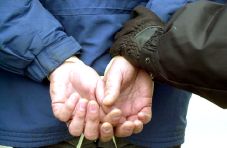
Protestors block the entrance to the Natick Army Research Lab in Natick, Massachusetts 20 March, 2003 where over a dozen arrests where made when demonstrators chained themselves and then trespassed onto government property. AFP PHOTO JOHN MOTTERN
One of dozens of anti-war protesters who marched to the U.S. Army Soldier Systems Center yesterday to protest American military action in Iraq, Walsh was among 18 arrested for attempting to block the research center’s gates.
“It’s a small price to pay for all the suffering,” said Walsh, who wore pictures of her grandchildren and a wounded Iraqi child around her neck. “I don’t want my children or my grandchildren to suffer the way this child has had to suffer.”
Organized by Sherborn’s Peace Abbey, the protest was timed to coincide with the start of military action in Iraq. Armed with signs, gas cans and flags, dozens of protesters massed on the Natick Common yesterday afternoon before marching about a mile north on Rte. 27 to the center’s entrance.
The demonstration was part of a nationwide campaign of civil disobedience the day after the president declared war on Iraq, organizer Lewis Randa said. “There are demonstrations all over the United States that are providing a forum for people to express their outrage at the United States attacking a country that is of no threat to us,” he said, as the group began its march.
Though waves and honks from passing drivers offered clear support for the protest, a number of onlookers offered pointed opposition.
“Men fought and died for this country so you could make fools of yourself,” one man shouted from a downtown doorway, as marchers filed past.
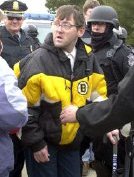 “I would not take part in something like that. I think it’s a disgrace,” Herb Haswell groused as he walked through the common.
“I would not take part in something like that. I think it’s a disgrace,” Herb Haswell groused as he walked through the common.
An Army veteran who spent more than 20 years in uniform and whose son is now stationed in Iraq, Haswell believes the protest was a slap in the face to veterans.
“This is a disgrace to anybody that’s ever fought for this country,” he said. “Everybody has a right, but I think it’s sad they feel this way. The kids that are over there now, they’d be pretty hurt to see something like this.”
Randa, however, maintained the group’s calls for an end to military action is a policy good for U.S. troops and the world.
“This is America, where each person needs to express his or her feelings about war and peace,” he said. “We believe strongly we’re supporting our soldiers.
“While Natick Labs can create gear to protect them from chemical and biological weapons, they cannot create anything to protect them from a foreign policy that puts them in harm’s way,” Randa said.
By the time protesters arrived at the research center, police and military officials were ready for them.
At least a half-dozen Natick Police officers, outfitted in riot gear and carrying batons and nearly twice as many soldiers stood guarding the gates. Some Labs employees watched from inside the complex’s fence.
With as many as 50 marchers looking on, a handful of protesters unfurled a red cloth to signify the “river of blood” in Baghdad, Randa said, then offered prayers of peace from each of the 12 major world religions.
As each prayer was read, protesters linked small lengths of chain together, forming a single chain which stretched across the complex’s entrance.
“I’m here because of a very strong belief. I feel I have to make a stronger action than just words,” said Natick resident Judith Rich. “The violence that was bestowed on us on 9/11 was terrorism, and now, in my name, more terrorism is being bestowed on the world.”
With the chain in place, protesters tried to block the entrance to the research center, but were quickly stopped by police.
“The Natick Police Department requests you leave here so you won’t be arrested,” Chief Dennis Mannix told protesters, explaining they were trespassing on federal property. “We would prefer you not be arrested.”
Demonstrators on the front lines were defiant.
With police vans ready to take protesters into custody, each steadfastly declared, “I refuse to leave.”
The 18 who refused to leave were arrested without incident and charged with trespassing, police said.
Those arrested, (now known as PeaceChain 18) were: Christine Lyons Moeller, 55, of Amherst, Thomas Shanley, 56, of Ware, Suzanne Shanley, 57, of Harwich; Thomas Lewis, 63, of Worcester, Lewis Randa, 55, of Sherborn, Christopher Shortsleeve, 20, of Boxboro, Joseph Dick, 51, of Natick, Paul McNeil, 52, of Spencer, Courtland Woods, 40, of Quincy, Sarah Fuhro, 61, of Natick, Dorothy Walsh, 61, of Dedham, Carol Bull, 50, of Cambridge, Judith Rich, 65, of Natick, Jess Hunter, 28, of Holliston, Carolyn Schuchardt, 50, of Ipswich, John Schuchardt, 63, of Ipswich, Sister William Hurley, 66, of Lowell, and Anne Lavallee, 43, of Uxbridge.
All 18 pleaded innocent during arraignments yesterday afternoon at Natick District Court and were released. The earliest any of the protesters will be back in court is April 3.
They said they would continue to oppose war in Iraq.
“I feel honored to stand up for my beliefs,” Judith Rich said
 THE BOSTON GLOBE
THE BOSTON GLOBE
Protesters snarl downtown streets
By Michael S. Rosenwald
Friday, March 21, 2003
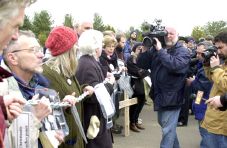 The Natick demonstration, which was organized by the Sherborn-based Peace Abbey, began at noon when about 100 people gathered at the Natick Common.
The Natick demonstration, which was organized by the Sherborn-based Peace Abbey, began at noon when about 100 people gathered at the Natick Common.
As the group marched a half-mile down Main Street toward the entrance to Natick Labs, they were greeted mostly with jeers as people pumped their fists out their car windows, yelling things like ”Move to France!” and ”You are an embarrassment to our country!”
”The feeling you get from some people is that you’re not with the troops,” said Bill O’Brien, 82, who received a Purple Heart in World War II. ”I’m definitely with the troops, but to bring them home. Because this war, it’s not justified.”
Among the 18 people arrested in Natick were a grandmother, a student at Harvard Divinity School, and a former Marine.
”I know that by doing what I’m doing today, it’s the only way I can be truthful to my faith, my reasons, and my beliefs,” one woman said before she was arrested. ”I will not be still until peace prevails.”
 DOVER SHERBORN PRESS
DOVER SHERBORN PRESS
Sherborn man hauled to jail after war protest
By Andrew Lightman/ Staff Writer
Thursday, March 27, 2003
NATICK – As Mike Randa, 15, watched police officers arrest his father and take him off to jail, only one emotion was on his mind: pride.
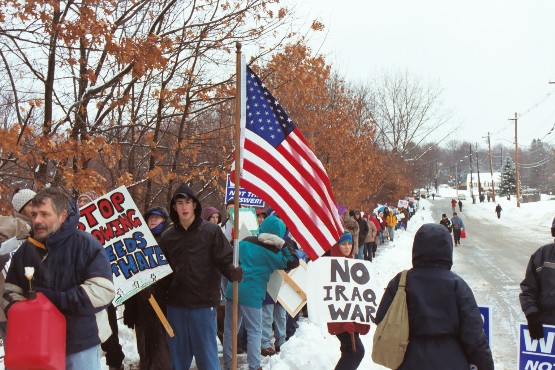 Mike Randa’s father, Peace Abbey director Lewis Randa, and 17 others were arrested by Natick police last week after peacefully protesting the war in Iraq outside the U.S Army’s Natick Labs. They were charged with trespassing, which is punishable by fines or imprisonment.
Mike Randa’s father, Peace Abbey director Lewis Randa, and 17 others were arrested by Natick police last week after peacefully protesting the war in Iraq outside the U.S Army’s Natick Labs. They were charged with trespassing, which is punishable by fines or imprisonment.
Mike, a sophomore at Dover-Sherborn Regional High School, said he was full of pride watching his father stand up in civil disobedience. Mike left school for the afternoon so that he could be there in support of peace and his father.
In fact, Mike said he would have protested, too, but he thought he was too young for people to take him seriously.
“It is to voice our opinion that peace is the only option and that war won’t solve anything,” he said. “I feel bad that the Iraqi citizens, who are innocent, could get hurt. I just hope that American soldiers don’t fire on innocent women and children.”
Some wearing pictures of Iraqi children around their necks just hours before the United States began its bombing campaign in Baghdad, Lewis Randa and roughly 50 others began their march from Natick Common to the Natick Labs. Along the way, Randa stopped only briefly, to shake hands with Natick Police Chief Dennis Mannix.
“These people here are not our enemies,” said Lewis Randa, referring to police and military personnel on hand. “And neither are the Iraqis. As a U.S.-led conflict in Iraq begins, we unite…and we will double our efforts to put an end to Bush’s doctrine of preemptive attack.”
“To the Iraqi citizens, we the people of the United States are not your enemy, George W. Bush is,” he added.
 Then standing in front of a red cloth which he said is symbolic of the river of blood in Iraq, Lewis Randa led a group of 18 people in prayers for peace. Giving personal statements in opposition to the war and reciting prayers from 12 major world religions, Randa and his group linked chains together to symbolically bar Natick Lab’s entrance.
Then standing in front of a red cloth which he said is symbolic of the river of blood in Iraq, Lewis Randa led a group of 18 people in prayers for peace. Giving personal statements in opposition to the war and reciting prayers from 12 major world religions, Randa and his group linked chains together to symbolically bar Natick Lab’s entrance.
The protesters openly questioned the motives and the morality behind a war in Iraq. But they were careful to show their support for all human life, including that of American soldiers.
“I support our military,” said Randa, “by wanting them to be returned home safely.”
Police and military personnel on hand allowed the group to carry out their demonstration before making arrests. Randa and Mannix negotiated the arrests after his group began a slow walk toward the police officers and the Natick Labs gate.
All 18 pleaded not guilty to the trespassing charges in court that same day. Their next court appearances are scheduled for early April.
Sherborn resident Marcia Hutchinson, who also attended to protest the military action, said she hopes the voices of the protesters will be heard.
“I think they’ve been contained for a long time,” she said about Iraq. “I think it’s a horrible precedent to set, and I am appalled by our [government’s] actions. Iraq is not a threat. We are a threat.”
————————————
 METROWEST DAILY NEWS
METROWEST DAILY NEWS
Natick Labs Protesters Reject Deal, will go to Court
By Norman Miller
Friday, April 4, 2003
NATICK — The self-titled “Peace Chain 18” will have their day in court after they rejected a plan yesterday that would have cleared their names of the trespassing charges they face.
The 18 peace activists from around the state were arrested March 20 for trespassing at the Natick Army Labs.
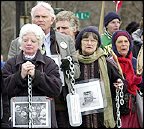
NATICK with story 03/20/03
Antiwar activists gather in front of Natick Labs Thursday. The chains were used to symbolically chain themselves to the Labs’ gate. (staff photo by Ken McGagh)
Yesterday, eight members of the group had a pre-trial conference scheduled at Natick District Court, but 14 of the defendants showed up.
The group filed a motion asking that 18 face court actions at the same time. Judge Sarah Singer did not rule on that motion, but offered to continue all of the cases without a finding for three months.
That means, she told the 14 in attendance, that if they weren’t arrested for three months, all charges would be dismissed.
The group, many affiliated with the Peace Abbey in Sherborn, refused the offer.
“We appreciate your offer for a continuance without a finding, but we reject it,” group member Carole Bull, 50, of Cambridge said.
The “Peace Chain 18” instead opted for a bench trial in front of Singer. The trial for the 14 in attendance will be May 20.
They know that most likely they’ll be found guilty, but Dorothy Walsh, 61, of Dedham, who is affiliated with the Peace Abbey, said the message is what’s important.
“There were a couple of reasons (why they rejected the judge’s offer),” said Walsh. “We wanted to have witnesses, and we couldn’t have witnesses today. There are two people from our group who are from Natick, and they don’t even know the real name of the Army Labs — the U.S. Army Soldiers and Biological Chemical Command — and they should know.”
The eight scheduled to appear yesterday were Walsh, Bull, Carol Schuchardt, 50, of Ipswich; John Schuchardt, 63, of Ipswich; Sister William “Willie” Hurley, 66, of Lowell; Suzanne Shanley, 57, of Harwich; Brayton Shanley, 56, of Ware and Judith Rich, 65, of Natick.
Each gave a small statement when asked if they were going to hire a lawyer or represent themselves. Each waived their right to an attorney. Several wore pictures depicting scenes from Iraq, such as injured children.
“I do represent myself as well as all of the voices of the children of Iraq,” Suzanne Shanley said.
Bull said, “We want to say that being witness to the violence that begets violence and there are other ways to achieve peace, even with dictators.”
John Schuchardt said both prosecutor Mark Youngblood and Singer should dismiss the case. He also thanked the court and Natick Police for being respectful of them during the arrest and court process.
“I am asking if the prosecutor wants to uphold the law, he should indict the U.S. Army Soldiers and Biological Chemical Command, and investigate war crimes by President Bush,” he said.
He also asked Singer to dismiss the case because it was his and his co-defendants’ duty to try to stop the war.
“When there are crimes such as the bombing of hospitals and war crimes, then the citizens have not only the right but the duty, to act in any way to stop these crimes,” Schuchardt said. “These are victims in Iraq, and it is the obligation of the court to be concerned for the victims.”
Singer said she respected their beliefs, but she could not dismiss the case at this stage if the district attorney’s office objected to the dismissal.
Youngblood said if the defendants agreed to admit to trespassing, a guilty charge would be entered and, as a group, they would have to pay $10,000 for the police overtime of that day.
Bull said they would admit to the facts if they could pay the $10,000 to Iraqi victims of U.S. bombings.
Singer rejected both ideas, and the group opted for the trial.
The other people facing the trespassing charges are Christine Lyons Moeller, 55, of Amherst; Tom Lewis, 63, of Worcester; Lewis Randa, 55, of Sherborn; Christopher Shortsleeve, 20, of Boxboro; Joseph Dick, 51, of Natick; Paul McNeil, 52, of Spencer; Courtland Woods, 40, of Quincy; Sarah Fuhro, 61, of Natick; Jess Hunter, 28, of Holliston and Anne Lavallee, 43, of Uxbridge.
 BOSTON GLOBE
BOSTON GLOBE
Antiwar Activists Slam US in Court Hearing
Among allegations: Support for Bio/Chemical Weapons at Lab
By Benjamin Gedan, Globe Correspondent, 4/4/2003
NATICK — In a dramatic courtroom display, 15 antiwar activists railed against the US military during a pretrial hearing in Natick District Court yesterday, demanding an opportunity to dispute charges of trespassing that stem from a March 20 protest at a local Army facility.
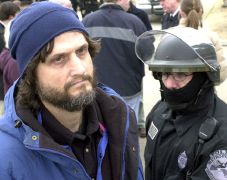 Speaking at length during the hearing, the antiwar activists called for an indictment of the US government for war crimes, and accused a local military facility, the US Army Soldier Systems Center in Natick, of conducting research on chemical and biological weapons.
Speaking at length during the hearing, the antiwar activists called for an indictment of the US government for war crimes, and accused a local military facility, the US Army Soldier Systems Center in Natick, of conducting research on chemical and biological weapons.
The 15 activists, who rejected a plea bargain offer of a $10,000 fine, could each be fined $100 and jailed for up to a year, said their lawyer, Donna M. Cuipylo. A spokesman for Middlesex District Attorney Martha Coakley would not confirm the plea bargain.
”The US just invaded Iraq, and we’re being charged with trespassing,” said Lewis Randa, director of the Sherborn-based Peace Abbey, which organized the protest.
”People in Massachusetts don’t know what’s really going on in Natick. What we’re insisting upon in Iraq, we’re refusing to do here,” he said.
US Army officials denied that the military was developing internationally banned chemical and biological weapons at the sprawling, heavily guarded facility, known locally as the Natick Labs.
Army scientists in Natick produce protective suits, meal packages, and body armor, said spokeswoman Patty Welsh. The facility does not make weapons, and houses no live chemical or biological agents, she said.
”We work on items that protect and sustain our soldiers,” Welsh said. ”The work we do here helps support our soldiers, who help support the Constitution, which gives them the right to protest.”
Jerry Whitaker, another spokesman, said the charges were ”not based in reality.”
No Army lab is developing banned weapons, said Miguel Morales, a spokesman for the Army’s Soldier and Biological Chemical Command.
”That is totally false. That is propaganda of the highest order,” Morales said of the group’s accusations. ”The US no longer produces chemical weapons, nor does it endorse the use of chemical weapons. We are not a rogue country.” In all, 18 peace activists were arrested at the Natick Labs after blocking the front entrance with chains.
The Peace Abbey has protested the facility for several years, but its March 20 gathering was only the second event held at the military compound, and the first that resulted in arrests, said Natick Police Lieutenant Al Morgan.
At yesterday’s court hearing, Judge Sarah B. Singer sat patiently while defendants condemned the war in Iraq. Many of the demonstrators wore photos of bandaged war victims draped across their chests.
”Citizens have the right to intervene however they can to halt these crimes,” said John Schuchardt, 63, a former US Marine who delivered a scathing address, in which he accused the US military of targeting civilians in its war in Iraq.
US officials have said repeatedly they are trying to minimize civilian casualties in the war.
While rejecting a request to dismiss the charges, Singer said she was ”moved” by the remarks.
”Every person in this room agrees that we will all be affected by this,” the judge said. ”I am deeply moved by the sincerity of your intentions.”
Until recently, Natick Labs scientists worked under the Army’s Soldier and Biological Chemical Command, which oversees the defense and destruction of America’s chemical and biological weapons stockpile.
Research with live agents, used to develop chemical suits, detectors, and decontamination equipment, is ongoing at the Edgewood Chemical and Biological Center in Maryland and the US Army Chemical School in Missouri, among other facilities. But in Natick, only ”simulants” are used to test biological and chemical suits, officials said.
The Army says it has destroyed 25 percent of its chemical weapons stockpile since 1985. The remaining material, including mustard agents, as well as VX and Sarin nerve agents, is stored at eight sites nationwide.
Antiwar demonstrators, however, vowed yesterday to continue efforts to close the Natick Labs. In a statement released after the hearing, the so-called ”PeaceChain 18” called the Natick facility the ”brain trust for the evils of biological and chemical weapons in the United States.”
”We’re accusing Iraq of precisely what’s in our back yard,” said Brayton Shanley, 56, at a strategy session before the court hearing. ”I think it’s a potent symbol.”
Benjamin Gedan can be reached at gedan@globe.com
This story ran on page B2 of the Boston Globe on 4/4/2003.
————————————–
 METROWEST DAILY NEWSPAPER
METROWEST DAILY NEWSPAPER
JUDGE FINDS 18 WAR PROTESTERS GUILTY OF TRESPASSING
By Norman Miller / News Staff Writer
Wednesday, May 21, 2003
NATICK — For almost seven hours yesterday, the members of the “PeaceChain 18” argued their trespassing at the Natick Army Labs in March was not only their right, but a necessity to fight what they said was the United States’ violation of international law.
But Natick District Court Judge Sarah Singer ruled against the peace activists during a bench trial, finding all 18 guilty of trespassing at the U.S. Army Soldier Systems Center on March 20. The group was on a road inside the Natick Labs property.
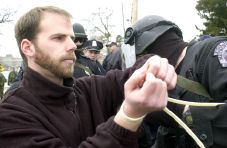 “Ladies and gentlemen, I’m impressed by your articulate and sincere testimonies, but I find that each of you are guilty of the Massachusetts law of trespassing,” said Singer.
“Ladies and gentlemen, I’m impressed by your articulate and sincere testimonies, but I find that each of you are guilty of the Massachusetts law of trespassing,” said Singer.
The judge said, “I don’t make the law in Natick. I’m asked to interpret it.
“Some of the words you use may resonate very strongly, but the law you are challenging is our trespass law,” said Singer. “There’s nothing unjust about our trespass law.”
Singer fined each defendant $50, or 10 hours of community service, with a month to decide.
Members of the self-named peace group either testified or offered statements on why they trespassed on the Natick Army Lab’s property during a peace protest.
Lewis Randa of the Peace Abbey in Sherborn said even though group members were found guilty, he doesn’t believe any would hesitate to protest again. He said he doesn’t believe any would pay the court’s fine.
“We’re not going to remain silent,” said Randa. “If there’s an attack on North Korea, we’ll be back out.”
Singer said at the beginning of the trial she would allow the defendants some latitude and reminded prosecutor Mark Youngblood of that when he repeatedly objected to various testimony.
Along with the PeaceChain 18, two character witnesses and an expert witness testified, as well as Natick Police Chief Dennis Mannix and Army Lab Security Chief Richard Polley.
Supporters of the protesters lined the entrance of the court’s parking lot. Three monks stood outside the court building door and banged drums and chanted throughout the day.
Youngblood did not offer an opening statement, but did make a motion not to allow the “necessity defense.”
“The Supreme Judicial Court has ruled that immediate and persuasive fear of war was not a relevant defense,” Youngblood said.
Singer said she would listen to a necessity defense, but did not say it would affect the verdict.
Protester Carole Bull, 50, of Cambridge said during opening statements that the PeaceChain 18 didn’t have a choice but to trespass at the military facility.
“This case is about more than trespassing, it’s about the right, responsibility and the need of the people of the United States to protect their constitutional rights,” Bull said.
Both Polley and Mannix testified the protesters had crossed over an imaginary line where they were told they couldn’t cross. When they were told to leave, they did not, and they were arrested.
Not one defendant denied not leaving federal property when told to do so, but all said they should not have had to listen.
“I was there to prevent a greater wrong,” said Joseph “Dan” Dick, 51, of Natick. “I think each individual was standing up for a higher good. I had to think that would have some effect.”
Randa said he needed to protest because of chemical and biological weapons developed throughout the country, including research at the Natick facility.
“We felt compelled to move forward with this protest because I can’t see another reason for the United States to store these agents of death, except to use them in the future,” he said. “The immediate threat is that we’re all members of the human family.”
Judy Rich, 65, of Natick compared the group’s civil disobedience to what colonists, abolitionists and Martin Luther King Jr. went through.
“Civil rights, we know, are based on civil disobedience,” said Rick. “Dr. King was arrested over 100 times, and today we have a national holiday.”
Dorothy Walsh, 61, of Dedham said as a grandmother she had to protest the war.
“I’m a wife, I’m a mother, I’m a grandmother, and I felt that day it was important for me as an elder to speak out,” she said.
Brayton Shanley, 56, of Ware, said the United States committed war crimes by attacking Iraq, giving him the right to protest on federal property.
“It’s a first-strike war, not a last-effort war, so this is an unjust war,” said Shanley. “We killed the innocent. We maimed the innocent. We killed hundreds of thousands of young men forced into conscription. We mowed them down. We came to Natick to say ‘no’ to murder.”
Christopher Shortsleeve, 20, of Boxboro said a guilty finding had a larger meaning.
“To convict someone of trespassing in protest of this war is like convicting someone for jaywalking to stop a murder,” he said.
“If we’re found guilty of trespassing, that means the war in Iraq is innocent. It can’t be both ways. If we’re found guilty, it means this court sanctions the war.”
Youngblood said during his closing argument the protesters picked the wrong forum to question the war. He said it should be argued in front of federal lawmakers.
Youngblood requested a $500 fine for each defendant, but some of the protesters disagreed.
“I morally can’t pay a fine,” said Tom Lewis, 64, of Worcester. “Five hundred dollars is a slap in the face for anyone who rejects violence.”
Defendant Suzanne Shanley, who broke into song as the court adjourned, asked what would happen, how long they would be jailed, if they refused to pay the fine or do community service.
“This is a court order,” said Singer. “I will give you a month to pay the fine or do the community service. We will not negotiate. If you do not, you will be held in contempt.”
The other people found guilty were Carol Schuchardt, 50, of Ipswich; John Schuchardt, 63, of Ipswich; Sister William “Willie” Hurley, 66, of Lowell; Christine Lyons Moeller, 55, of Amherst; Paul McNeil, 52, of Spencer; Courtland Woods, 40, of Quincy; Sarah Fuhro, 61, of Natick; Jess Hunter, 28, of Holliston; and Anne Lavallee, 43, of Uxbridge.
——————————-
THE BOSTON GLOBE
ACTIVISTS FOUND GUILTY OF TRESSPASSING
Group of 18 says it won’t appeal; $900 fine levied
By Benjamin Gedan, Globe Correspondent, 5/21/2003
NATICK — After a trial that spanned six hours and featured bitter condemnation of US foreign policy, Natick District Court Judge Sarah B. Singer convicted 18 peace activists yesterday of trespassing and fined the group a total of $900.
The charges stemmed from a protest on March 20 at the US Army Soldier Systems Center, a heavily guarded facility in Natick that the activists have accused of developing chemical and biological weapons.
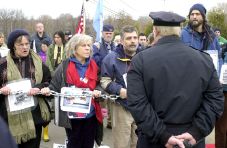 Lewis Randa, director of the Sherborn-based Peace Abbey, which organized the protest, said the group would not appeal. All 18 planned to complete 10 hours of community service instead of paying the fine, he said.
Lewis Randa, director of the Sherborn-based Peace Abbey, which organized the protest, said the group would not appeal. All 18 planned to complete 10 hours of community service instead of paying the fine, he said.
”While we are disappointed with the verdict, we’re not surprised,” Randa said outside the courtroom, where supporters in yellow robes had chanted and beat on drums throughout the preceedings.
The activists rejected a plea bargain offer last month of a $10,000 fine, said their legal adviser, Donna M. Cuipylo.
At yesterday’s unwieldy trial, the 18 defendants alternated as witnesses and attorneys. Singer repeatedly overruled objections from the state prosecutor, allowing prolonged oration about civil disobedience, religious doctrine, and the war in Iraq.
”Martin Luther King was jailed over 100 times and now we have a national holiday for him,” testified Judith Rich, 65, of Natick. ”It is often ordinary citizens who lead the way to a more just society.”
Other supporters lined East Central Street outside the courthouse, waving placards at passing motorists.
The 18 activists were arrested at the military research complex, known locally as Natick Labs, during an antiwar rally. After sprawling on a red carpet and reciting peace prayers, the group had blocked the front gate with a thick, metal chain.
Answering trespassing charges at a pretrial hearing on April 3, the so-called ”PeaceChain 18” called for an indictment against the Army for allegedly violating international arms control agreements.
Yesterday, however, the group focused on its own activities, arguing that it broke state law to halt a graver offense: alleged American human rights violations in Iraq.
”Law ought to prevent, not protect, evil,” said John Schuchardt, 50, his shaking hands displaying a photograph of exploding buildings in Baghdad.
Group members also failed to persuade the judge of their so-called ”necessity” defense, in which they argued that US military action had placed them in imminent danger of terrorist reprisals.
”My country was about to attack another country that did not provoke that response,” said Randa, who promised to continue protesting Bush administration policy. ”I felt it would trigger a catastrophic event.”
The group also put the Iraqi invasion on trial, repeatedly calling the war an illegal and immoral action.
Christopher Shortsleeve, 20, of Boxborough, said a guilty verdict would grant legal validation to what he condemned as an illegal war.
After hearing lengthy personal statements and several character witnesses, the judge praised the activists, saying their commitment to ”fundamental values” had impressed her.
But she dismissed the possibility of ignoring state law and legal precedent, calling the request ”offensive and improper.”
Speaking in measured tones, Singer said Henry David Thoreau had spent a night in jail for his civil disobedience, the unavoidable price of breaking American law.
”I simply cannot ignore the Supreme Judicial Court,” she said before delivering the verdict.
Civil disobedience, Singer added, ”always implies a willingness to accept the consequence of one’s actions.”
Benjamin Gedan can be reached at gedan@globe.com.
This story ran on page B2 of the Boston Globe on 5/21/2003.
|
|||
———————-
BOSTON GLOBE
Six Peace Activists Refuse Sentence
They trespassed at Natick Labs, Face Jail Time
By Benjamin Gedan, Globe Correspondent, 6/20/2003
NATICK — Six peace activists convicted of trespassing on a US military facility have refused to comply with their sentence and will face possible imprisonment. A hearing is scheduled for next week.
At their trial last month in Natick District Court, Judge Sarah B. Singer ordered all 18 to pay $50 or perform 10 hours of community service.
The maximum sentence for trespassing is 30 days in jail and a $100 fine.
At their daylong trial, Singer expressed sympathy with the activists and allowed extensive criticism of US foreign policy and alleged war crimes. During sentencing, however, she said she was obligated to hand down a punishment.
”America is a country of laws,” she said. ”I simply cannot ignore the Supreme Judicial Court.”
As the court deadline approached yesterday, six activists vowed to disobey her order.
Lewis Randa, director of the Sherborn-based Peace Abbey, which organized the protest, said antiwar demonstrations were a public service and participants should not be compelled to perform additional duties.
Obstructing the front gate of the military facility, known locally as Natick Labs, helped publicize an unjust war, he said in an interview outside the court.
Accepting the sentence, he added, would undermine that message.
”By doing so, it would be tantamount to saying that what we did in front of the gates was not community service,” he said.
Sharing fresh bread in the court parking lot yesterday, the activists said they were prepared for incarceration. Between prayers and legal strategy, they discussed their tolerance for jail, visiting hours, and the possibility of vigils. At a hearing before Judge Paul Healy, the activists rejected their original sentence.
”I can’t in conscience pay the money or do the community service,” said Thomas Lewis, 63, of Worcester, who said he had served three years in a Pennsylvania penitentiary for destroying draft records during the Vietnam War. ”I welcome jail.” Healy declined to sentence the activists, instead referring the case to Singer.
The activists will next appear in court on June 26.
In addition to the trespass offense, the six face possible contempt of court charges, said Peter T. Elikann, a Boston criminal attorney and the vice chairman of the state Bar Association’s individual rights and responsibilities section.
The charges could result in up to 60 days in jail, he said.
”It is obviously against the law not to comply with the judge’s order,” Elikann said in an interview. ”[She] can certainly enforce a harsher punishment.”
Three activists have paid the fine and nine others performed community service, including five who pulled weeds and pruned flowers at a public garden in downtown Natick.
Dorothy Walsh, 61, of Dedham, said the gardening complemented the message behind the initial protest.
”The bombs of war destroy not only people,” she said, ”but they destroy the earth.”
Benjamin Gedan can be reached at gedan@globe.com
This story ran on page B2 of the Boston Globe on 6/20/2003.
———————–
BOSTON GLOBE
Activists toil in public gardens
Protesters convicted of trespassing work in community service
By Alison O’Leary Murray, Globe Correspondent, 6/22/2003
–
The rose garden at the corner of Marion and West Central streets in Natick has had a face lift, thanks to the efforts of peace protesters arrested for blocking the entrance of Natick Labs during a March 20 antiwar demonstration.
On Monday, a handful of protesters, serving out their sentence of 10 hours of community service, weeded and gardened in a town-owned plot kitty-corner from the Natick courthouse, where Judge Sarah B. Singer convicted 18 people last month of trespassing.
They continued their work Tuesday at gardens along the Charles River at the South Natick dam.
Singer fined the group $900, but most have chosen to work off their sentence, including those who got their hands and knees dirty working for the town. As of last week, 12 had either paid the fine or completed some form of community service.
The remaining six have refused to do either and are expected to be back before Singer in the next few weeks. Though the trespassing conviction would likely bring a brief stint in jail, the six could face additional time behind bars if Singer holds them in contempt of court for defying her earlier sentence.
The gardening was a different kind of event for a group that was arrested while draped in galvanized chains and wearing photos of war victims on their chests. During their trial last month, many of them extolled the purposeful protests of Thoreau, Martin Luther King Jr., and other icons of civil disobedience during their trial here.
The idea of serving the sentence by working in Natick’s public gardens came to Dot Walsh, one of the protesters and a Dedham resident, when she helped another town volunteer, Nancy Halpern, weed at the dam earlier this spring. Halpern was once paid by the town for the work but said she now tends Natick’s gardens for free, because she cannot stand to see them overgrown and unkempt.
The protesters brought their politics along with their gardening expertise.
”As I was working, I was thinking about caring for the earth. It’s basic for human beings to love and have pride for the earth,” said Walsh, a program coordinator for Sherborn’s Peace Abbey, where the March protest was organized. ”There was a connection to our commitment to not bomb, which causes huge damage to the earth as well as to people.”
The work also provided some good visibility: The five protesters who weeded Monday brought a sign that read ”War is not the answer.”
While they received some signs of support from drivers, one man was provoked by the sign and approached Walsh and the others to express his disagreement.
”We listened to him, and he listened to us. It was a good thing,” she said. ”At least we talked about the issue.”
Walsh noted that antiwar protesters were the first to ask questions about the justification of the war in Iraq that are only now being raised by Congress and the British Parliament.
John Schuchardt and his wife, Carrie, of Ipswich, performed some of their community service at A Place to Turn. They would do it all over again, they said.
”The United States is on a self-destructive course,” Schuchardt said in a telephone interview. ”We have to do what we can to appeal to repentance and conversion, and we will continue to be in places whenever possible to stand up for peace and justice.”
This story ran on page 1 of the Globe West section on 6/22/2003.
DOVER SHERBORN PRESS
Peace Activists Decide to Pay Up
By Norman Miller/ Staff Writer
Wednesday, July 2, 2003
NATICK – Facing two months of jail, the last six members of the “Peacechain 18” paid fines or accepted probation last Thursday after initially balking at court penalties for trespassing at Natick Army Labs.
Initially, 18 people who called themselves the Peacechain 18 were arrested and charged after they refused to leave federal property in their protest against the war in Iraq. Twelve members of the group paid fines or performed 10 hours of community service; the remaining six had told a judge last week that they would serve two days in jail as punishment.
But things changed last week when the six found out the jail time could reach 60 days and that it would be imposed for contempt of court, not for trespassing.
“I didn’t want the judge to think I was in contempt of the court – I had nothing but respect for her,” said Brayton Shanley, 56, of Ware, who along with his wife, Suzanne, 57, did the community service this week. “I didn’t want to go to jail for contempt. I wanted to go to jail for trespass.”
Lewis Randa of Sherborn, another member of the “Peacechain,” said, “It was all about what took place at the Natick Labs, not in the court. It was about the war in Iraq. We found out there was a potential to go to jail for 60 days, and I didn’t want to go to jail for contempt. I’m willing to go to jail to protest the war in Iraq.”
Carole Bull of Cambridge was the final member of the group to appear in court. Bull, through attorney David Marr, told Judge Sarah Singer she had no disrespect for the court. She said she wanted to go to jail for two days to pay for her trespassing conviction, but did not want to be in contempt.
Singer changed the penalty she imposed from the fine or community service, to three months probation.
“I was willing to go to jail today for two days, but I didn’t want to get into the contempt arena,” said Bull. “This wasn’t about me and the court, it was about what took place in Iraq, and what’s still taking part in Iraq.”
Suzanne Shanley said the group wanted to make a statement by going to jail for the trespassing.
“We didn’t want to make a statement out of contempt,” she said.
The other two members of the group who did community service during the week were Thomas Lewis, 64, of Worcester, and Christine Lyons Moeller, 55, of Amherst.
The 18 people were arrested March 20 after they trespassed on federal property at the Natick Army Labs, also known as the U.S. Army Soldier Biological and Chemical Command.
The rest of the members of the group either paid the $50 fine or completed the community service.
The other members of the Peacechain 18 are Dorothy Walsh, 61, of Dedham; Carol Schuchardt, 50, of Ipswich; John Schuchardt, 63, of Ipswich; Sister William “Willie” Hurley, 66, of Lowell; Judith Rich, 65, of Natick; Christopher Shortsleeve, 20, of Boxborough; Joseph Dick, 51, of Natick; Paul McNeil, 52, of Spencer; Courtland Woods, 40, of Quincy; Sarah Fuhro, 61, of Natick; Jess Hunter, 28, of Holliston; and Anne Lavallee, 43, of Uxbridge.
Peace Chain 5
Iraq Troop Surge civil disobedience action in January 2007. Participants:
Louise Coleman, Carol Coakley, Judy Rich, Sara Fuhro and Lewis Randa.
——————————————–
BIG DIG PROTEST
1998 Civil Disobedience to Protest Human Service Funding Cuts
————————————–
PEACE CHAIN
In Memorium
“Willie” is Sr. William Julie Hurley
“Willie” is Sr. William Julie Hurley, a sixty-something Sister of Notre Dame who has devoted her life to work with the poor and marginalized of society. Whether it is teaching in southern Africa, serving in prison ministry, or coordinating hospice support for people living with AIDS, she brings a large measure of compassion, caring, and impish good humor to her work. Today she teaches seniors at Lowell Catholic High, a poor school trying to provide quality education for inner-city youth.
![]() So what was it that brought her to trial on May 20th, and had the rest of us in the Atlantic New England Region of the O Beautiful Gaia Project worried that one of our best “bass” singers would be unable to join us in the recording studio later this month? In March, a few days after the beginning of the most recent US-Iraq war, the Peace Abbey in Sherborn, Massachusetts, organized a demonstration at the U.S. Army Soldier Biological and Chemical Command in Natick, MA. Willie, along with seventeen other committed people of faith, knelt in front of the gate of this high-security installation, recited prayers for peace representing twelve major faith groups world-wide, and then joined themselves together with short lengths of chain link, symbolically blocking the entrance to what is believed to be the coordination center for the United States’ chemical and biological weapons program. They were immediately arrested and charged with trespassing on federal property.
So what was it that brought her to trial on May 20th, and had the rest of us in the Atlantic New England Region of the O Beautiful Gaia Project worried that one of our best “bass” singers would be unable to join us in the recording studio later this month? In March, a few days after the beginning of the most recent US-Iraq war, the Peace Abbey in Sherborn, Massachusetts, organized a demonstration at the U.S. Army Soldier Biological and Chemical Command in Natick, MA. Willie, along with seventeen other committed people of faith, knelt in front of the gate of this high-security installation, recited prayers for peace representing twelve major faith groups world-wide, and then joined themselves together with short lengths of chain link, symbolically blocking the entrance to what is believed to be the coordination center for the United States’ chemical and biological weapons program. They were immediately arrested and charged with trespassing on federal property.
One of the reasons the PeaceChain 18, as they came to be called, insisted on a trial was their determination to give public witness to their beliefs and motives for opposing the war and the US weapons industry. Having chosen to represent themselves rather than having legal counsel present, each was permitted five minutes to make a statement to the court.
 What did happen gives me hope for the future of truth-telling and justice in our land. As reported by Ann, another member of the O Beautiful Gaia Project, so many supporters from the peace community arrived at Natick District Court to witness the trial that the courtroom could not hold them all. They divided into groups and took turns listening in the courtroom during a full day of testimony. Presiding Judge Sarah Singer heard not only the statements of all eighteen defendants, but also allowed testimony from Dr. Michael True, an expert witness on the nature and history of non-violence, and from George Capaccio of Voices in the Wilderness and from a Paulist priest who served as character witnesses.
What did happen gives me hope for the future of truth-telling and justice in our land. As reported by Ann, another member of the O Beautiful Gaia Project, so many supporters from the peace community arrived at Natick District Court to witness the trial that the courtroom could not hold them all. They divided into groups and took turns listening in the courtroom during a full day of testimony. Presiding Judge Sarah Singer heard not only the statements of all eighteen defendants, but also allowed testimony from Dr. Michael True, an expert witness on the nature and history of non-violence, and from George Capaccio of Voices in the Wilderness and from a Paulist priest who served as character witnesses.
At the end of the day, the Judge responded by observing that she was very impressed with the values and sincerity of each of the defendants. She then explained that her sole duty was to rule on the charge of trespass, and that based on the uncontested facts of the case, she had to find them guilty of trespassing on federal land. The prosecutor, when asked by the judge to suggest a sentence, responded that his recommendation was a $500.00 fine for each defendant. The judge then ruled that each defendant was to pay a $50.00 fine or do ten hours of community service.
The voices that advocate war and call for a violent solution to every conflict may appear to be the loudest just now. But in every time of trial God raises up other voices, such as those of Sister Willie and her companions in the PeaceChain 18, to speak truth to power and to witness to the way of peace. We are richly blessed to have such people in our midst.
After a gallant struggle with breast cancer, Sister Willie passed from this world to the next in early July 2007. To the end her wit and determination, her joyful and loving presence, were an inspiration to all who knew her.
Taken from Singing with Crows explores the intersections of religion with politics and with our common life.
+
Paul McNeil, Poet, Activist
By Suzanne Shanley
 Paul McNeil was an amazing friend whose cancer diagnosis and decline, startled and staggered all who knew him. Yet, with his typical depth and intensity, he focused on his interior world, spitting out a poem on his encroaching death and merging with God, becoming God’s own self which returns Paul, in the poem, to himself as the” I Am” of the poem. So typically Paul these sentiments–depth, power, seriousness, literature, and, love…most emphatically, of his family, Claudia, his wife and their eight children.
Paul McNeil was an amazing friend whose cancer diagnosis and decline, startled and staggered all who knew him. Yet, with his typical depth and intensity, he focused on his interior world, spitting out a poem on his encroaching death and merging with God, becoming God’s own self which returns Paul, in the poem, to himself as the” I Am” of the poem. So typically Paul these sentiments–depth, power, seriousness, literature, and, love…most emphatically, of his family, Claudia, his wife and their eight children.
For Paul, family included the human family and the Agape family too, so he joined with Brayton and me, and fifteen others, a group arrested the day the US invaded Iraq, where chemical weapons research occurs. We became known as The PeaceChain 18.
Paul was present at the St. Patrick’s Day Peace Parade, marching with Veterans for Peace, shunned by the parade committee for years because of their peace banners. A devout Catholic, he came to Agape, disillusioned with the church after his father exposed him to Dorothy Day, and to “unconditional love of God,” as he wrote in Agape’s 25th Anniversary booklet, living from then on, “at odds with the institutional Church’s words and practices.”
Paul’s devotion to Agape came from his sense that he had found his spiritual home: “I savor the Mass and other events there, because it is the experience of loving community…I don’t hold out much hope for the institutional church…spiritually dead…fundamentally flawed to the core. The church needs conversion.”
+
Tom Lewis, Artist, Activist
 (March 17, 1940 – April 4, 2008)
(March 17, 1940 – April 4, 2008)
Forty years ago next month, Tom Lewis and eight other Vietnam War protesters strode into the offices of U.S. Selective Service Board 33 in Catonsville and was a member of PeaceChain 18 which closed down the Chemcial Weapons Research Laboratory in Natick, Ma after the invasion of Iraq. Both actions left a mark on history.
The “Catonsville Nine” emptied file cabinets, hauled 600 draft records into the parking lot and burned them with homemade napalm. Then they prayed and waited to be arrested.
That act of civil disobedience on May 17, 1968, inspired headlines – and more than 200 protests at draft board offices across the country. The tone of Vietnam War protests changed, becoming angrier and more intense as the war dragged on for seven more years.
Mr. Lewis’ activism on behalf of peace continued through the rest of his life, ending only Friday, when he died in his sleep at his home in Worcester, Mass., at the age of 68. He might have suffered heart failure, said his brother, Don Lewis, although the medical examiner’s office has not declared a cause of death.
“It was a calling for him to take a stand about what he saw wrong in the world,” said Don Lewis, 72, a retired science teacher who lives in Hampstead. “It was a way of life – there were things going wrong, and he had to make a statement about it.”
Tom Lewis was part of a famed group of Catholic anti-war activists led by Philip and Daniel Berrigan, both priests. The trial of the Catonsville Nine would land Mr. Lewis in prison for more than three years – and become the subject of a play and a movie.
Five of the Catonsville Nine are still living – Daniel Berrigan, Thomas and Marjorie Melville, John Hogan and George Mische.
 Tom Lewis had been scheduled to appear in Baltimore on May 8 at a 40th-anniversary commemoration that is to feature a movie titled Investigation of a Flame by Lynne Sachs at the Creative Alliance at the Patterson in Highlandtown.
Tom Lewis had been scheduled to appear in Baltimore on May 8 at a 40th-anniversary commemoration that is to feature a movie titled Investigation of a Flame by Lynne Sachs at the Creative Alliance at the Patterson in Highlandtown.
Despite Mr. Lewis’ death, the event will go on, said Megan Hamilton, an organizer of the Creative Alliance.
“The Catonsville Nine took everything one step further, and they radicalized the anti-war movement in America. It went from a peaceful, wholly nonviolent movement to actually destroying the machinery of the war machine,” she said.
Mr. Lewis was also a member of the “Baltimore Four,” a group that poured blood on draft records at a city Selective Service office in October 1967.
He continued his activism for four decades, even after he moved to Massachusetts in the 1970s. He picketed the White House recently to express opposition to the Iraq war, and he was arrested in 2005 outside the Sudanese Embassy in Washington in a protest against genocide in Darfur.
“His commitment to justice and peace flowed out of his love and art, and began with civil rights, continued with opposition to the Vietnam War, and the nuclear arms race, and the current U.S. war in Iraq,” said a longtime friend, Scott Schaeffer-Duffy.
Tom Lewis was also a painter whose art portrayed his belief in peace and justice. “There are a lot of good artists, but there aren’t a lot of truthful artists – and he was one of them,” said Brendan Walsh, a lifelong friend and founder of the Viva House soup kitchen in Baltimore. “He combined his power as an artist and his power as a human against the forces of death.”
In one of Mr. Lewis’ black and white etchings, called Ghetto, a Christ figure hangs between fire escapes. In another work, Crucifixion Triptych, a cross appears to double as a black nuclear explosion crucifying mankind, according to a story in The Sun about Mr. Lewis’ work.
His fellow Catonsville Nine protester, Daniel Berrigan, who was also imprisoned in the incident, wrote poetry about Tom Lewis’ paintings. One poem about Crucifixion Triptych included the words “image of hell/image of our landscape/the hell we hammer/on the face of fair creation.”
Elizabeth McAlister, Philip Berrigan’s widow and a friend of Mr. Lewis for 40 years, said he thought it was tragic that the United States launched the Iraq war after all the errors of Vietnam. “It’s more of the same,” Ms. McAlister said of the two wars. “He was strongly opposed to [the invasion of Iraq], he grieved over it, like we had learned nothing from all the death and destruction in Vietnam.” Tom engaged in civil disobedience with PeaceChain 18 to opposed the invasion of Iraq and his witness carried with it the legacy of Catonsville Nine. A portion of Tom’s cremation remains are buried at the Conscientious Objectors Cremation Cemetery on the grounds of the Pacifist Memorial in Sherborn.
Mr. Lewis was born on St. Patrick’s Day in 1940, one of four children of a manager with the National Biscuit Co. (later Nabisco). The family moved several times as the father switched positions within the firm, going from Uniontown, Pa., to Cambridge, Mass., to Philadelphia, Louisville and then Baltimore.
Tom Lewis arrived here at about age 17 and graduated from Mount St. Joseph High School in 1958. He worked on a Greek freighter and went to Europe for almost a year to study drawing.
He was attracted to the protest movement in 1965 when he went to the Gwynn Oak amusement park in Baltimore to sketch civil rights demonstrators and found himself standing in a crowd that began stoning them. “He joined the protesters and never looked back,” according to a profile of him in The Sun.
After spending three years at a federal penitentiary in Lewisburg, Pa., for burning draft records, Mr. Lewis moved to Massachusetts in the mid-1970s. There he devoted himself to painting, and his work was exhibited in New York, Baltimore and Boston.
Anti-War Demonstrations Around the WorldRevolutionary Worker #1195, April 20, 2003, posted at rwor.org We received the following from the A World to Win News Service: 7 April 2003. A World to Win News Service.Resistance to the war continued all over the world in the last week, from teach-ins to poetry readings and cultural events, to demonstrations large and small, targeting various military facilities that provide aid or support to the war on Iraq, as well as U.S. and U.K. embassies. In some parts of the world demonstrations have occurred daily. Following is a partial list of actions from March 31 to April 7. United States : Demonstrations took place in Oakland, Chicago, Washington, Pittsburgh and Detroit (Detroit suburbs have a large Arab population of Yemenis, Palestinians and Lebanese who oppose U.S. policy in Iraq). In Boston, a courtroom battle is taking place this week stemming from a 20 March protest where 18 people were arrested. The “Peace-Chain 18” blocked the entrance of Natick Laboratory, which develops chemical and biological equipment and supplies. The accused and other protesters are struggling to turn this trial into an indictment of the war. One of the 18, stated ironically, “The U.S. government just invaded Iraq and we are being charged with trespassing.” Turkey: The anger of the Turkish masses was heightened by the double-cross of the Turkish Prime Minister who agreed to allow the transport of U.S. war materiel through Turkey into northern Iraq. A news agency reported, “The United States suspended the move of the equipment because angry Turks who oppose the war were pelting the trucks with eggs and stones, breaking several truck windows.” On Sunday, thousands gathered in Istanbul Square. Thousands demonstrated also on 4 April. Colin Powell’s visit also was the leaven that gave rise to a demonstration by university students in Ankara on 2 April. Palestine: On 4 April, Palestinians carried mock coffins on the UN and the Arab League through the streets of Gaza as thousands took to the streets to protest the war in Iraq. Thousands also demonstrated in Nablus and the refugee camp of Nuseirat on the same day. Also on 4 April, women in Ramallah protested against the Anglo-American coalition and in favor of an Iraqi victory. In Jenin on 3 April, a demonstration marked the first anniversary of the Israeli army operation “Defensive Shield” in which 53 Palestinians and 23 Israelis were killed. Even Tel Aviv saw antiwar demonstrations on 2 April. Lebanon: The Kuwait embassy was the scene of antiwar protests in Beirut on 4 April. On 2 April over 10,000 Lebanese and Palestinians demonstrated in Sidon. Banners called for death to the U.S. and U.K. The American flag was burned. Egypt: On 4 April, once again police in Cairo prevented people from demonstrating outside of their mosque after Friday prayers. In Alexandria on 1 April thousands held an antiwar rally in the sports stadium. Jordan: There were demonstrations in Amman on 4 April. Syria: Hundreds of women demonstrated in Damascus on 1 April after Colin Powell demanded Syria stop supporting terrorism. Indonesia: Daily demonstrations have taken place in various cities around the country. In Jakarta people burned effigies of Bush in front of the U.S. embassy on 6 April. Earlier in the week, people demonstrated in Solo in Central Java, throwing tomatoes at the U.S. consulate. Students pelted the embassy with rotten tomatoes on 1 April. On Sunday, demonstrations took place in many areas of the country, Jakarta, East Java, Bandung, and South Kalimantan. Philippines: In Manila, 3,000 marched through the financial district beating drums, shouting no to war and kicking around a toy dog with a mask of President Gloria Macapagal Arroyo’s face on it. Thailand: 80,000 people marched in Bangkok on 4 April, burning effigies of Bush and American flags. 30,000 prayed against the war in the streets of Pattani, a predominantly Muslim town. Malaysia:In Kuala Terrengganu, a small town south of the capital, 2,000 members of the political opposition group marched against the war. Bangladesh : On 3 April tens of thousands took to the streets of Dhaka, burning effigies of Bush. Witnesses said that the American Life Insurance Company building was also set on fire. India: Again this week, Delhi and Allahabad were the scene of demonstrations against the war. South Korea: This government recently announced it would send troops to fight with the U.S./U.K. coalition, in defiance of the wishes of the vast majority of South Koreans. On 4 April, students in Seoul tried to march on the U.S. embassy but were prevented by the police. In another part of the city the daily vigil for two young girls killed in an accident by a U.S. military vehicle one year ago was turned into an antiwar rally. Australia : An antiwar flotilla rallied in Sydney Harbor in front of PM John Howard’s residence. On the city streets demonstrators burned American flags and were arrested later while causing “havoc” in the city. Greece: With demonstrations occurring almost daily, on 3 April this country came to a halt. A one-day national general strike against the war shut down state services and businesses and disrupted flights at all Greek airports. Athens saw over 10,000 demonstrators shouting antiwar slogans in front of the U.S. embassy. Thessaloniki saw 15,000 march to the U.S. consulate. Public opinion polls say that 95% per cent of Greeks are against the war. Ireland : People from all over Ireland, including both the Irish Republic and the British colony of Northern Ireland, were organizing to converge on Belfast 7 April in opposition to the Bush/Blair summit scheduled to discuss their anti-people efforts in Northern Ireland and Iraq. Britain: Many demonstrations have taken place across the country, including thousands in London who marched on the U.S. Embassy. Arrests were made as demonstrators tried to block the streets around the Embassy. A major effort to “reclaim the bases” is taking place at naval bases in Portsmouth and Plymouth. Minister of Defense Geoff Hoon has been hounded by protesters particularly following his outspoken defense of British force’s use of cluster bombs. Germany: Several cities across the country saw demonstrations this week. Antiwar groups focused on U.S. military headquarters in Heidelberg, demanding that the German government end all assistance to the U.S. war effort. Bulgaria: In Sofia, 2,000 people marched against their government’s pro-U.S. stand on the war, which is opposed by the overwhelming majority. A petition against the war of 900,000 signatures was presented to the government. Bosnia-Herzegovina: Sarajevo students hurled eggs and red paint against the fence of the U.S. embassy. Spain: Barcelona students marched against the war on 1 April. On 6 April, up to an estimated half a million people took part in an open-air protest/concert in Madrid. In Santiago (Galicia), at least 20,000 marched, as did several thousand more in two cities in Salamanca. Four more offices of the ruling political party were trashed by protesters. Italy: Naples protesters marched on the U.S. consulate. Ghana : Accra residents demonstrated for the first time against the Iraq war. South Africa: About 1,000 Cape Town residents marched to the parliament to demand that the government end arms contracts with the U.S. and U.K. and countries supporting the war like “Israel and Australia.” Argentina: 2,000 unemployed, trade union members and war veterans demonstrated. One banner read “The same enemy: yesterday, the Malvinas, today Iraq” (referring to British aggression in 1982 when it prevented Argentina from taking back the British colony the UK calls the Falklands). Brazil : A thousand demonstrated in Rio de Janeiro, burning effigies of Bush. Peru: Lima residents held a rally condemning the war. El Salvador : 10,000 gathered in the capital, San Salvador, to protest the war. Costa Rica: Streets in San Jose were filled with bloody bones, while demonstrators condemned their president for supporting Bush’s war. Natick District Court Peace Garden at Lincoln Square cared for by Peace Chain 18”
+
|
